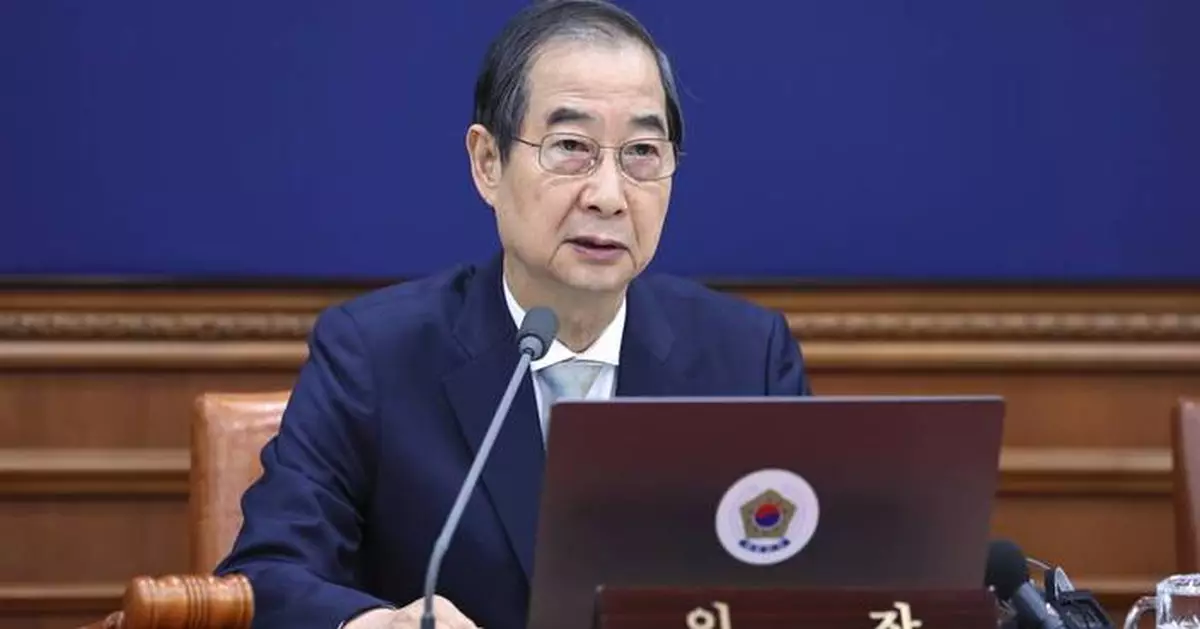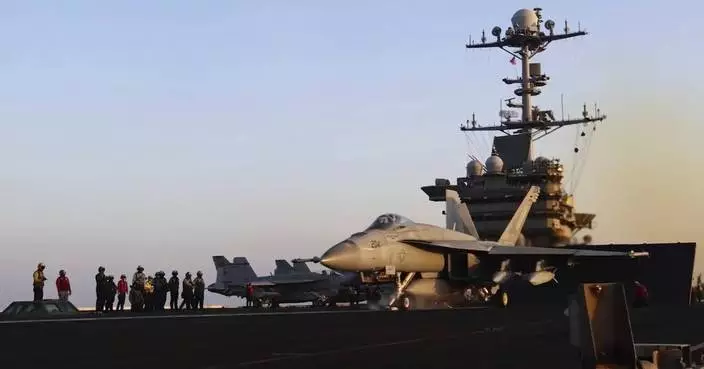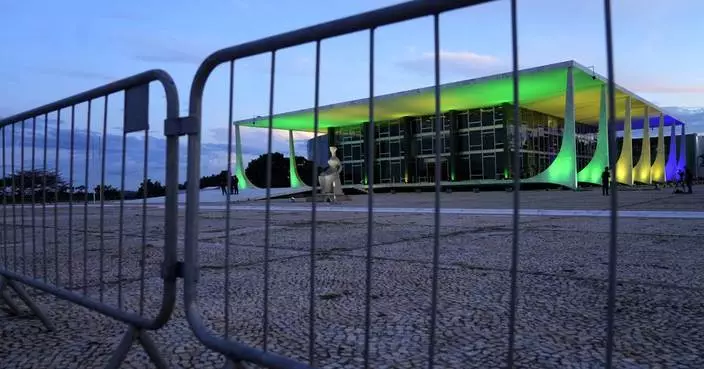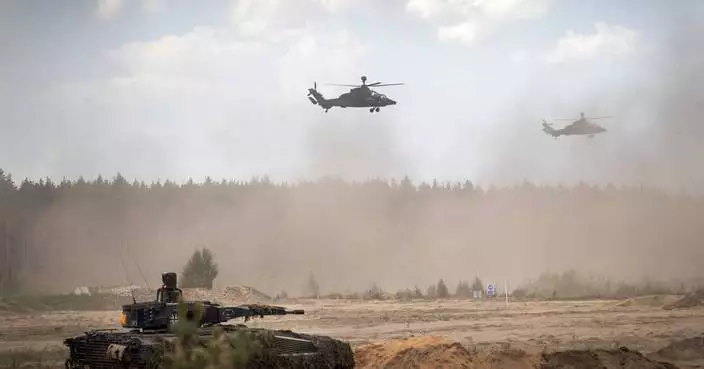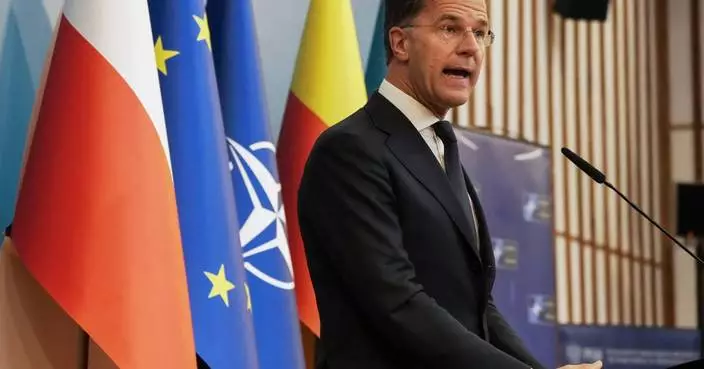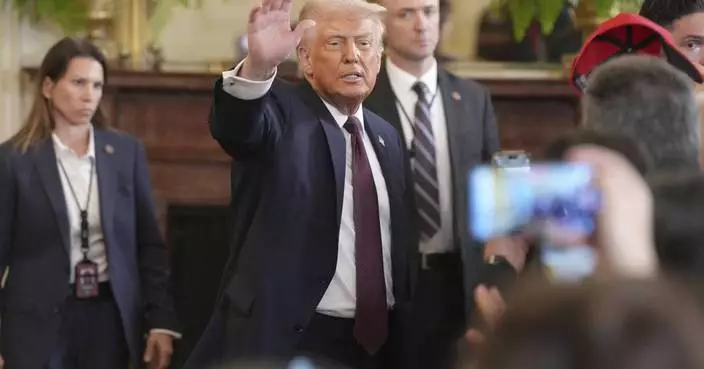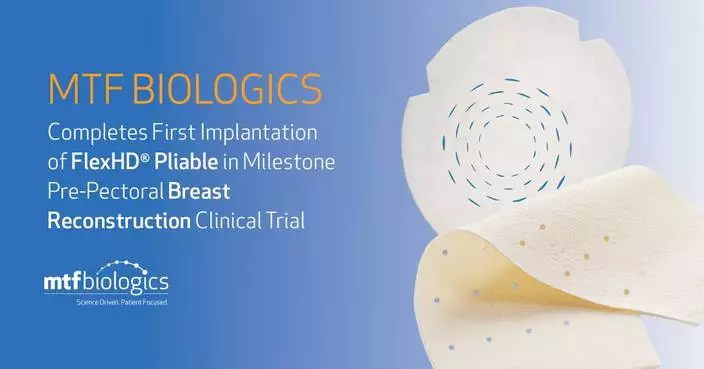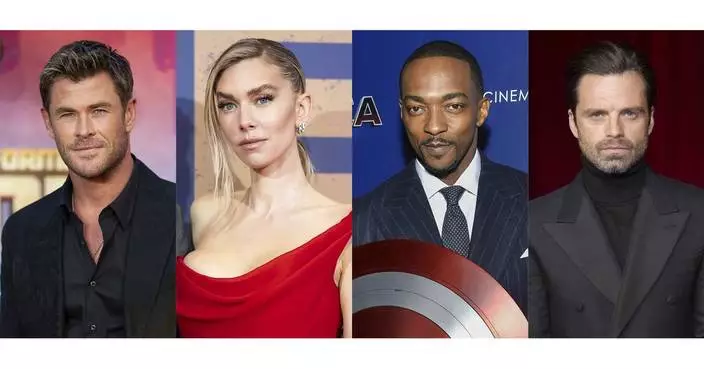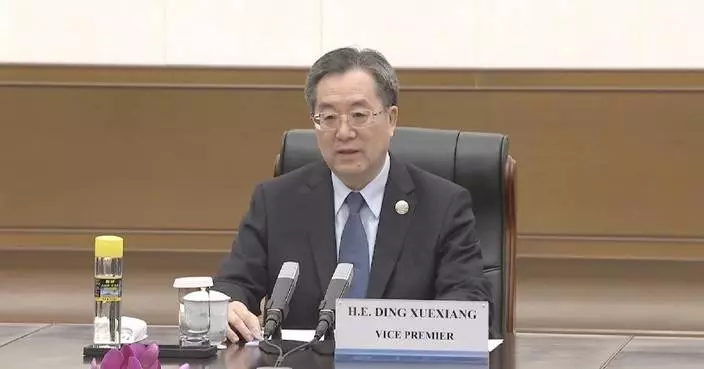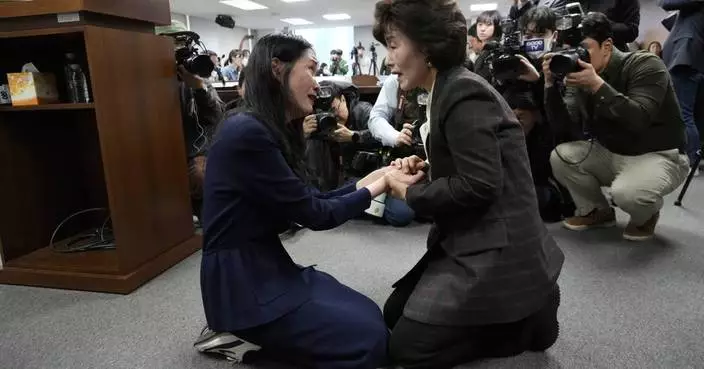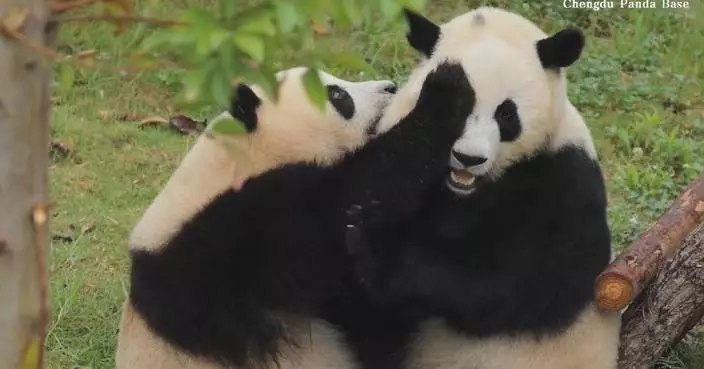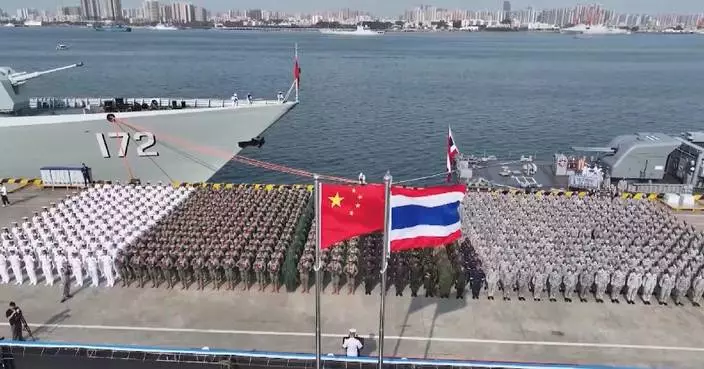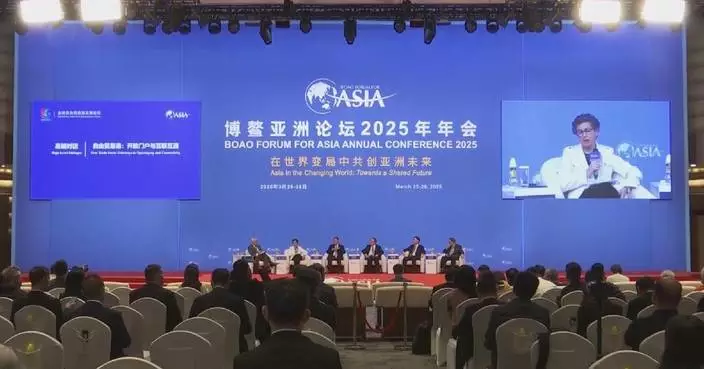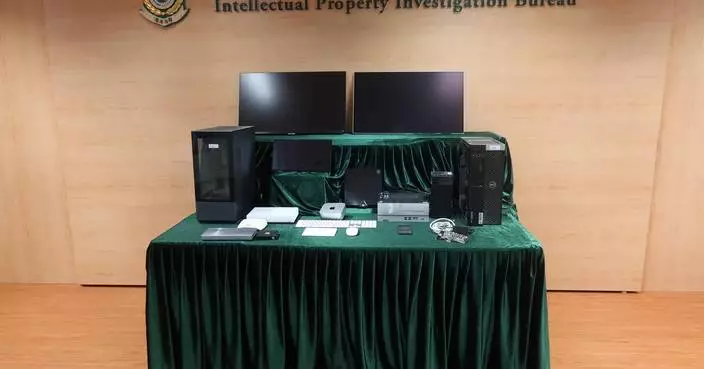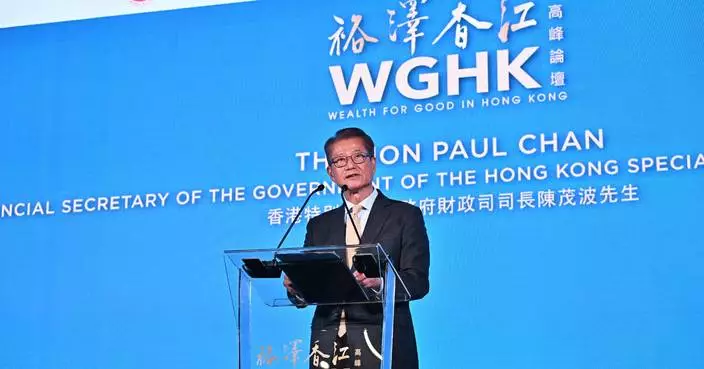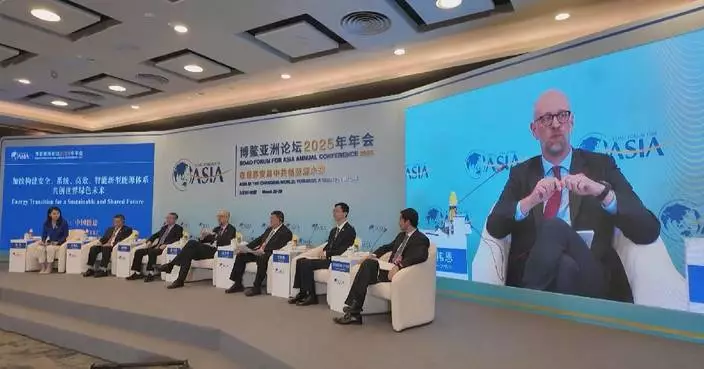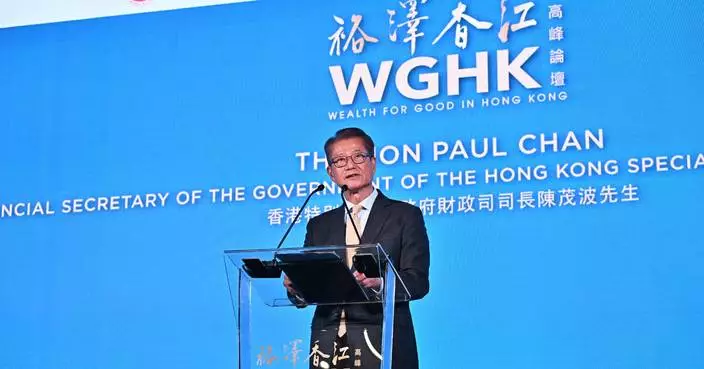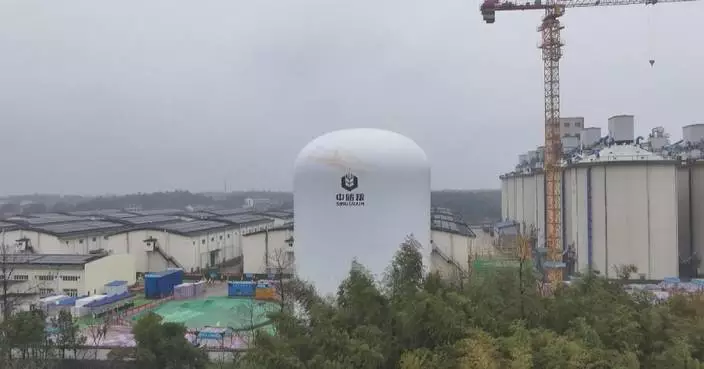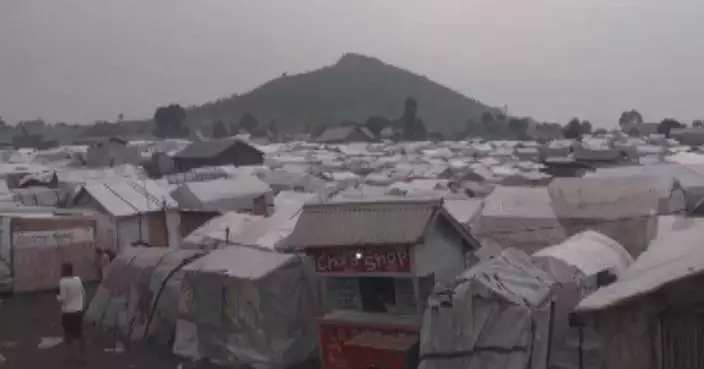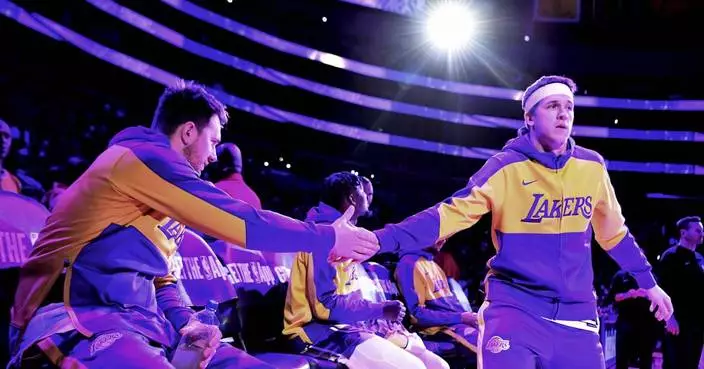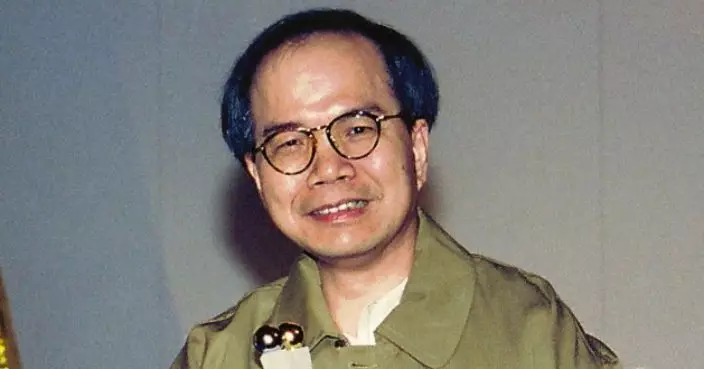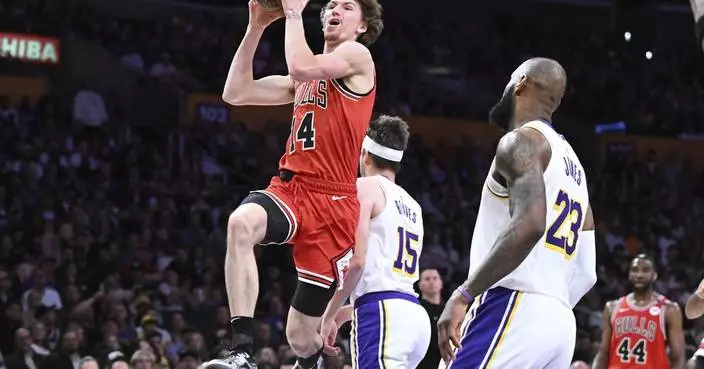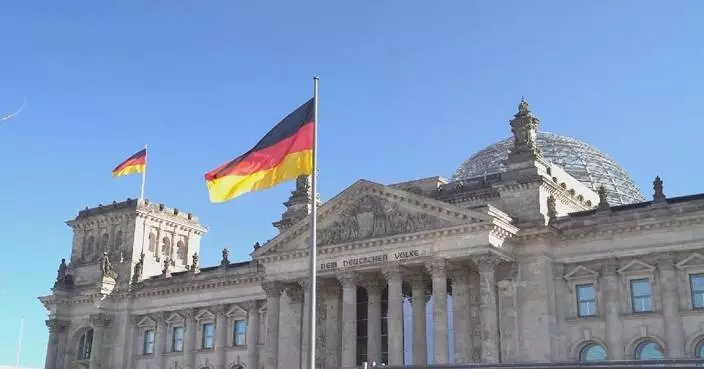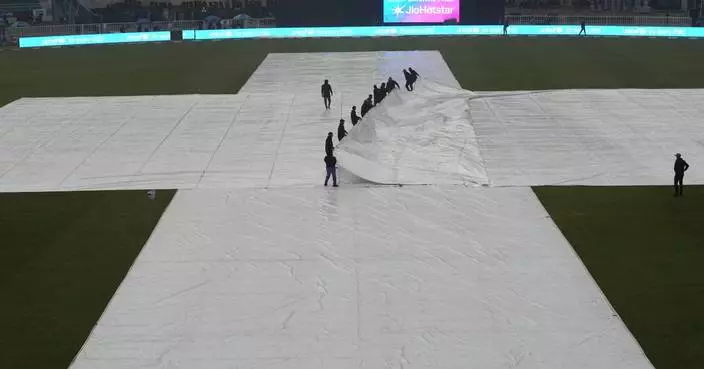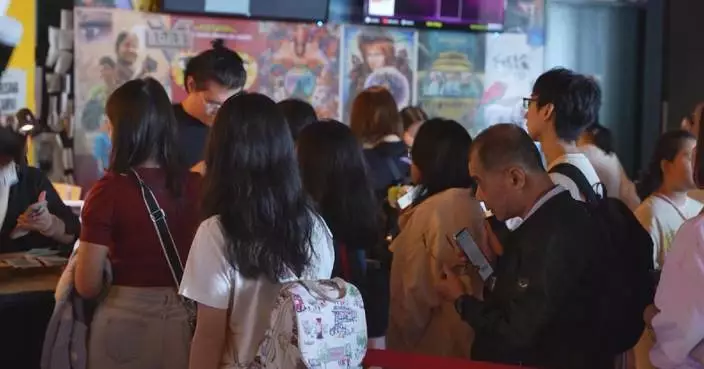SEOUL, South Korea (AP) — South Korea’s Constitutional Court overturned the impeachment of Prime Minister Han Duck-soo, reinstating the nation's No. 2 official as acting leader Monday while not yet ruling on the separate impeachment of President Yoon Suk Yeol over his shocking imposition of martial law in December.
Many observers said the 7-1 ruling in Han's case did not signal much about the upcoming verdict on Yoon, as Han wasn’t a key figure in imposing martial law. But the ruling could still embolden Yoon’s staunch supporters and ramp up their political offensive on the opposition.
Click to Gallery
Protesters stage a rally calling for South Korean acting President Han Duck-soo to step down in front of the Government Complex in Seoul, South Korea, Monday, March 24, 2025. The banners read "Dismiss Yoon Suk Yeol and Han Duck-soo." (AP Photo/Ahn Young-joon)
A member of the main opposition Democratic Party, front, and members of the ruling People Power Party stand in front of the Constitutional Court in Seoul, South Korea, Monday, March 24, 2025. The banners read "Dismiss Yoon Suk Yeol," front, and "Dismiss impeachment." (AP Photo/Ahn Young-joon)
Moon Hyung-bae, fourth right, acting chief justice of South Korea's Constitutional Court, and other judges arrive for the impeachment verdict for South Korean Prime Minister Han Duck-soo at the Constitutional Court in Seoul Monday, March 24, 2025. (Kim Min-Hee/Pool Photo via AP)
Moon Hyung-bae, acting chief justice of South Korea's Constitutional Court, presides over the impeachment verdict for South Korean Prime Minister Han Duck-soo at the Constitutional Court in Seoul Monday, March 24, 2025. (Kim Min-Hee/Pool Photo via AP)
South Korean acting President Han Duck-soo bows during a briefing at the Government Complex in Seoul, South Korea, Monday, March 24, 2025. (AP Photo/Ahn Young-joon, Pool)
South Korean acting President Han Duck-soo, center, arrives to hold a briefing at the Government Complex in Seoul, South Korea, Monday, March 24, 2025. (AP Photo/Ahn Young-joon, Pool)
South Korean acting President Han Duck-soo speaks during a briefing at the Government Complex in Seoul, South Korea, Monday, March 24, 2025. (AP Photo/Ahn Young-joon, Pool)
South Korean acting President Han Duck-soo speaks during a briefing at the Government Complex in Seoul, South Korea, Monday, March 24, 2025. (AP Photo/Ahn Young-joon, Pool)
South Korean Prime Minister Han Duck-soo, center, speaks to the media as he arrives at the Government Complex in Seoul Monday, March 24, 2025, after the Constitutional Court dismissed the impeachment of the prime minister. (Jung Yeon-je/Pool Photo via AP)
South Korean Prime Minister Han Duck-soo, center, speaks to the media as he arrives at the Government Complex in Seoul Monday, March 24, 2025, after the Constitutional Court dismissed the impeachment of the prime minister. (Jung Yeon-je/Pool Photo via AP)
South Korean Prime Minister Han Duck-soo arrives at the Government Complex in Seoul, South Korea Monday, March 24, 2025. (Heon-Kyun Jeon /Pool Photo via AP)
South Korean Prime Minister Han Duck-soo speaks to the media as he arrives at the Government Complex in Seoul Monday, March 24, 2025, after the Constitutional Court dismissed the impeachment of the prime minister. (Jung Yeon-je/Pool Photo via AP)
South Korean Prime Minister Han Duck-soo, center, speaks to the media as he arrives at the Government Complex in Seoul Monday, March 24, 2025, after the Constitutional Court dismissed the impeachment of the prime minister. (Jung Yeon-je/Pool Photo via AP)
South Korean Prime Minister Han Duck-soo, left, arrives at the Government Complex in Seoul, South Korea Monday, March 24, 2025. (Heon-Kyun Jeon /Pool Photo via AP)
South Korean Prime Minister Han Duck-soo arrives at the Government Complex in Seoul, South Korea Monday, March 24, 2025. (Heon-Kyun Jeon /Pool Photo via AP)
South Korean Prime Minister Han Duck-soo, center, speaks to the media as he arrives at the Government Complex in Seoul Monday, March 24, 2025, after the Constitutional Court dismissed the impeachment of the prime minister. (Jung Yeon-je/Pool Photo via AP)
South Korean Prime Minister Han Duck-soo speaks to the media as he arrives at the Government Complex in Seoul Monday, March 24, 2025, after the Constitutional Court dismissed the impeachment of the prime minister. (Jung Yeon-je/Pool Photo via AP)
FILE - Impeached South Korean acting President Han Duck-soo leaves the government complex building in Seoul, South Korea, on Dec. 27, 2024. (Hong Hae-in/Yonhap via AP, File)
FILE - South Korea's acting President Han Duck-soo speaks at the government complex in Seoul, South Korea, on Dec. 26, 2024. (Choi Jae-koo/Yonhap via AP, File)
FILE - South Korea's Prime Minister Han Duck-soo, who became the country's acting leader after President Yoon Suk Yeol's impeachment, speaks during a cabinet meeting at the government complex in Seoul, South Korea, on Dec. 24, 2024. (Yonhap via AP, File)
Speaking with reporters following his reinstatement, Han thanked the court for what he called “a wise decision” and promised to focus on tackling “urgent matters,” including a fast-changing global trade environment, in an apparent reference to the Trump administration’s aggressive tariffs policy. He also called for national unity, saying: “There’s no left or right — what matters is the advancement of our nation.”
South Korea has been thrown into political turmoil since Yoon, a conservative, declared martial law on Dec. 3 and sent hundreds of troops to the liberal opposition-controlled National Assembly and other places in Seoul. Yoon's decree lasted only six hours as enough lawmakers managed to enter an assembly hall where they quickly voted down the decree.
The assembly impeached Yoon on Dec. 14, alleging he violated the Constitution and other laws by suppressing assembly activities and trying to detain politicians. Yoon's impeachment made Han acting president until he was impeached in late December.
The unprecedented, successive impeachments that suspended the country’s top two officials intensified domestic division and deepened worries about South Korea's diplomatic and economic activities.
A major trigger for the opposition’s push to impeach Han was his refusal to fill three vacant seats at the Constitutional Court's nine-member bench. That was a highly explosive issue because the court needed support from at least six justices to approve Yoon's impeachment and filling its empty posts could make such a decision more likely.
After Han was suspended, his successor as acting president, Choi Sang-mok, appointed two new justices but left the ninth seat vacant.
Han was also accused in the impeachment motion of abetting Yoon’s martial law declaration and obstructing efforts to open independent investigations into Yoon’s alleged rebellion in connection with his martial law decree.
On Monday, seven of the Constitutional Court's eight justices ruled to overturn or dismiss Han's impeachment. They ruled that his alleged actions weren’t against the law or weren’t serious enough to remove him from office or his impeachment motion didn't even met a required quorum when it passed thorough the assembly. One justice upheld Han’s impeachment.
The main liberal opposition Democratic Party expressed regret over the court’s decision to reinstate Han and urged it to dismiss Yoon quickly. Yoon’s office welcomed Monday’s ruling, saying it shows again the opposition’s repeated uses of impeachment motions were “reckless, malicious political offensive.”
Observers earlier had predicted the Constitutional Court would rule on Yoon’s case in mid-March, but it hasn’t done so, sparking varied speculation on possible reasons.
“Today’s verdict will give hope to Yoon’s supporters for a similar fate and hope for Yoon’s opponents for his ouster,” said Duyeon Kim, a senior analyst at the Center for a New American Security in Washington. “But it’s too soon to predict the court’s verdict on Yoon because the specific details of both cases and allegations are different.”
Kim said the reinstatement of Han, a career bureaucrat, will bring more stability to South Korea compared to when his powers as acting president were suspended.
Massive rival rallies backing or denouncing Yoon have divided the streets of Seoul and other major cities in South Korea. Earlier surveys showed that a majority of South Koreans were critical of Yoon’s martial law enactment, but those supporting or sympathizing with Yoon have later gained strength.
Yoon argues that his martial law introduction was a desperate attempt to bring attention to the “wickedness” of the Democratic Party which obstructed his agenda and filed many impeachment motions against senior officials. Yoon critics counter he likely tried to use military rule to frustrate possible special investigations into scandals involving him and his wife.
Senior military and police officers sent to the assembly have said that Yoon ordered them to drag out lawmakers to prevent a floor vote to overturn his decree. Yoon says the troops' deployment was designed to maintain order.
If the court upholds Yoon’s impeachment, South Korea must hold a presidential election to choose his successor. If it rules for him, Yoon will regain his presidential powers.
Yoon has separately been charged with directing rebellion, a charge that carries the death penalty or a life sentence if he is convicted.
Associated Press writer Kim Tong-hyung contributed to this report.
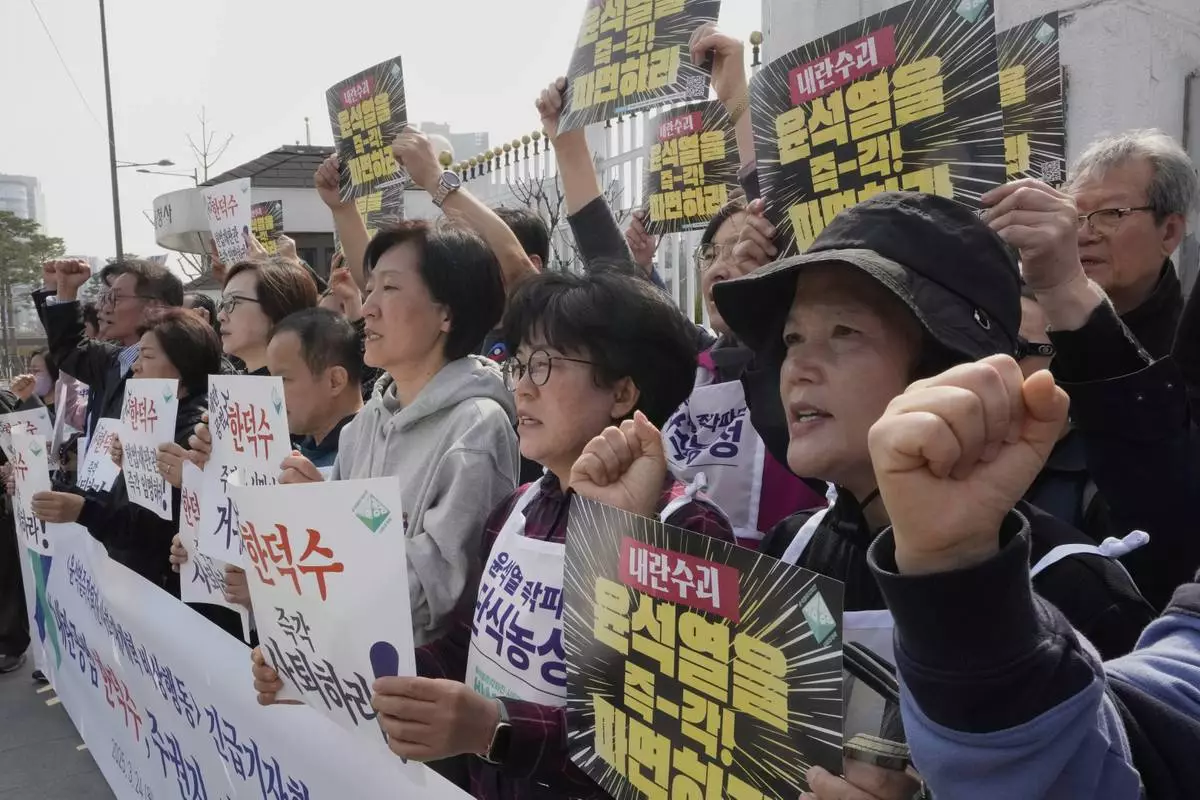
Protesters stage a rally calling for South Korean acting President Han Duck-soo to step down in front of the Government Complex in Seoul, South Korea, Monday, March 24, 2025. The banners read "Dismiss Yoon Suk Yeol and Han Duck-soo." (AP Photo/Ahn Young-joon)
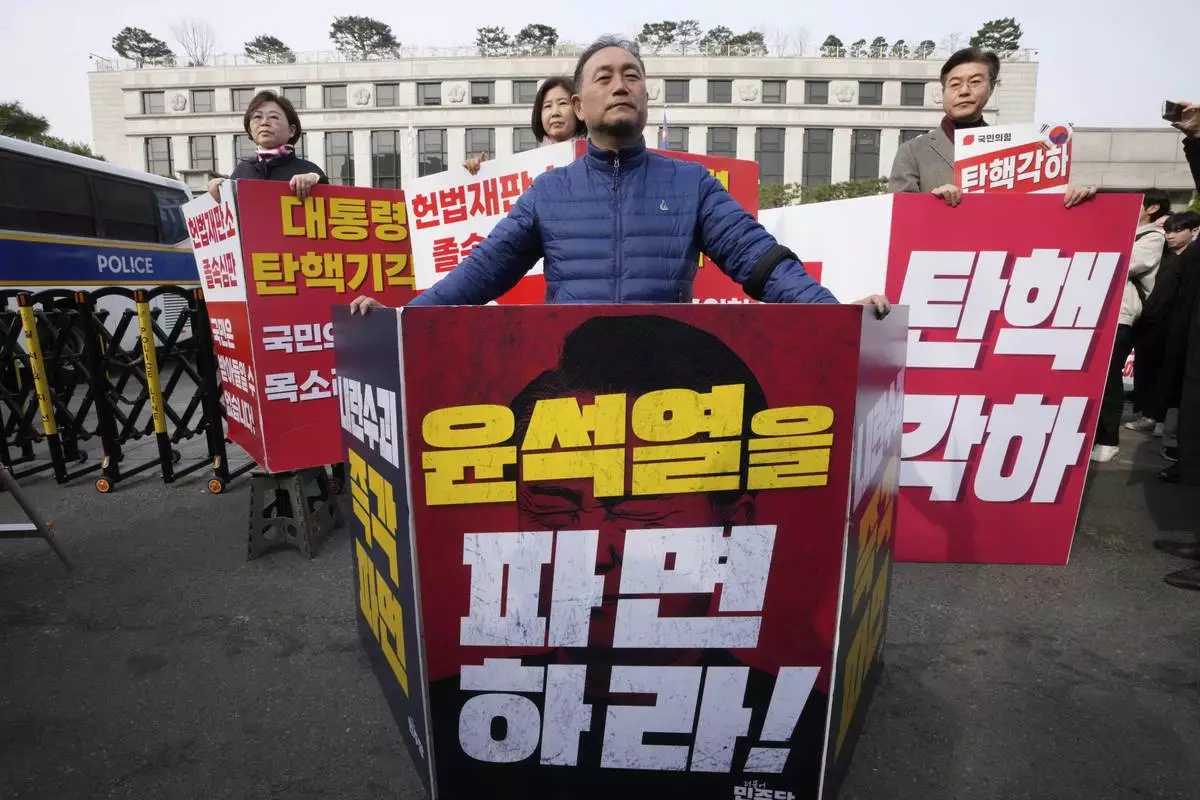
A member of the main opposition Democratic Party, front, and members of the ruling People Power Party stand in front of the Constitutional Court in Seoul, South Korea, Monday, March 24, 2025. The banners read "Dismiss Yoon Suk Yeol," front, and "Dismiss impeachment." (AP Photo/Ahn Young-joon)
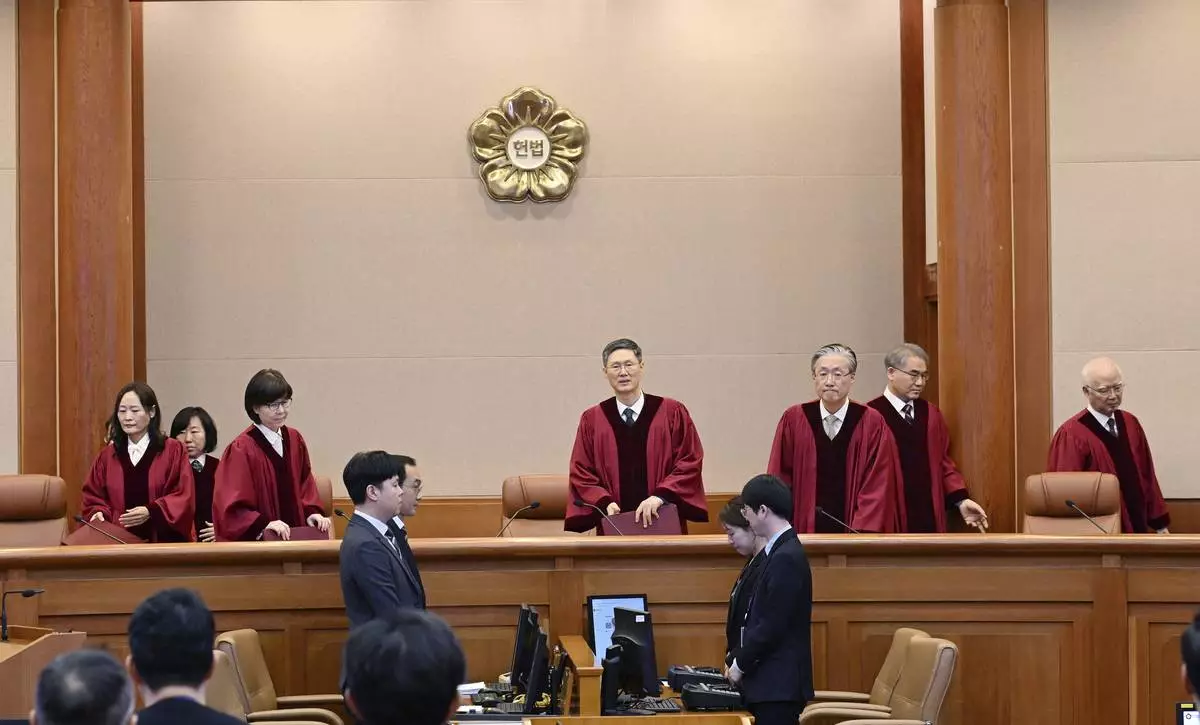
Moon Hyung-bae, fourth right, acting chief justice of South Korea's Constitutional Court, and other judges arrive for the impeachment verdict for South Korean Prime Minister Han Duck-soo at the Constitutional Court in Seoul Monday, March 24, 2025. (Kim Min-Hee/Pool Photo via AP)
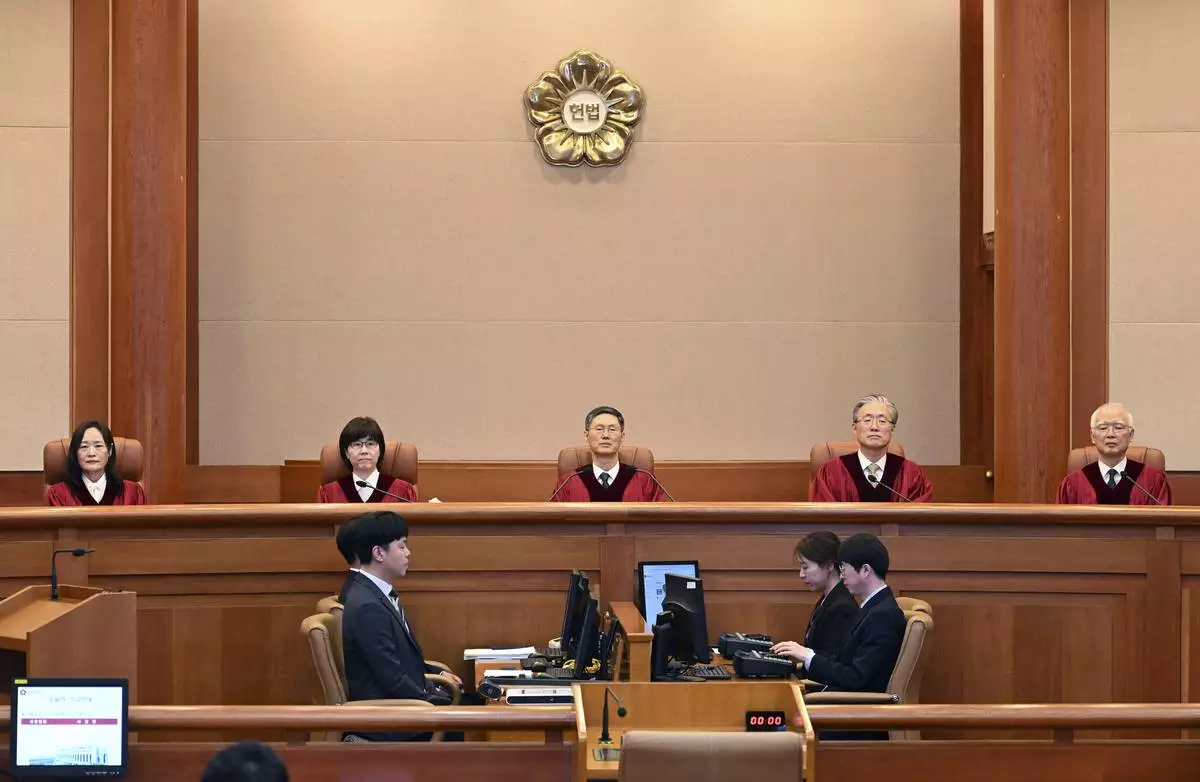
Moon Hyung-bae, acting chief justice of South Korea's Constitutional Court, presides over the impeachment verdict for South Korean Prime Minister Han Duck-soo at the Constitutional Court in Seoul Monday, March 24, 2025. (Kim Min-Hee/Pool Photo via AP)
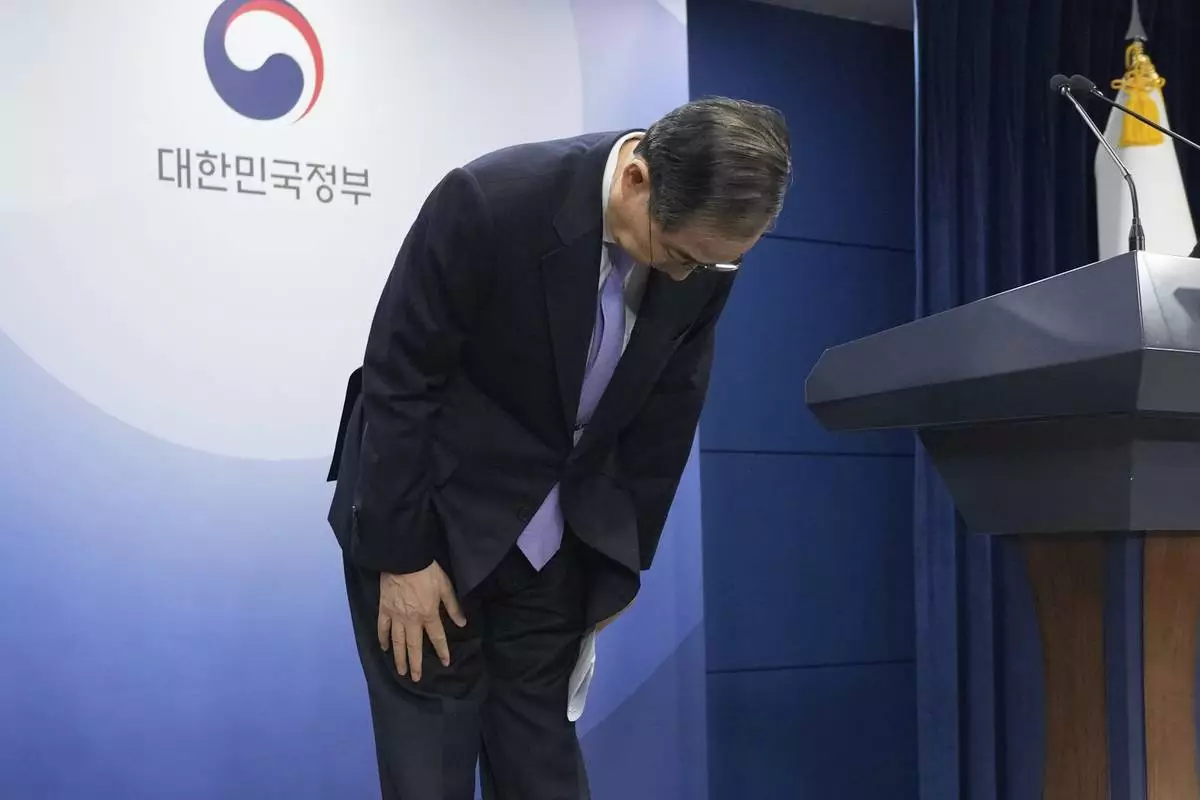
South Korean acting President Han Duck-soo bows during a briefing at the Government Complex in Seoul, South Korea, Monday, March 24, 2025. (AP Photo/Ahn Young-joon, Pool)
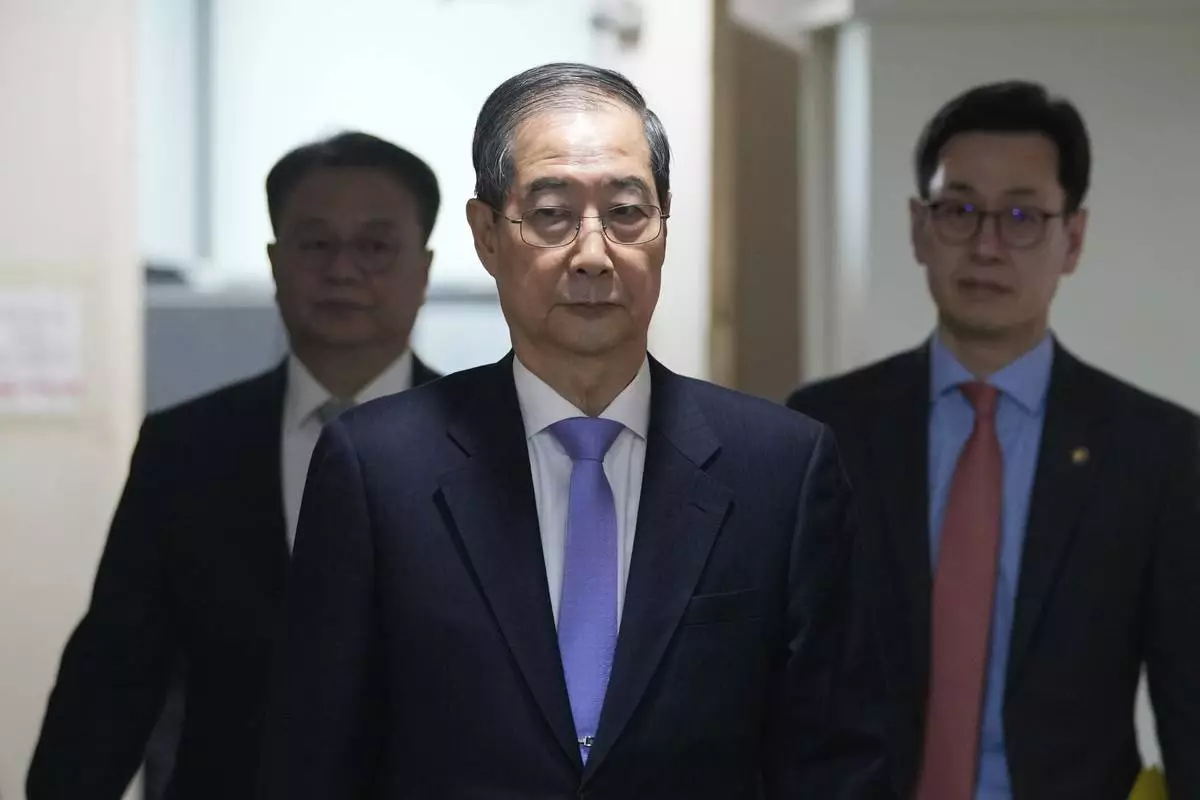
South Korean acting President Han Duck-soo, center, arrives to hold a briefing at the Government Complex in Seoul, South Korea, Monday, March 24, 2025. (AP Photo/Ahn Young-joon, Pool)
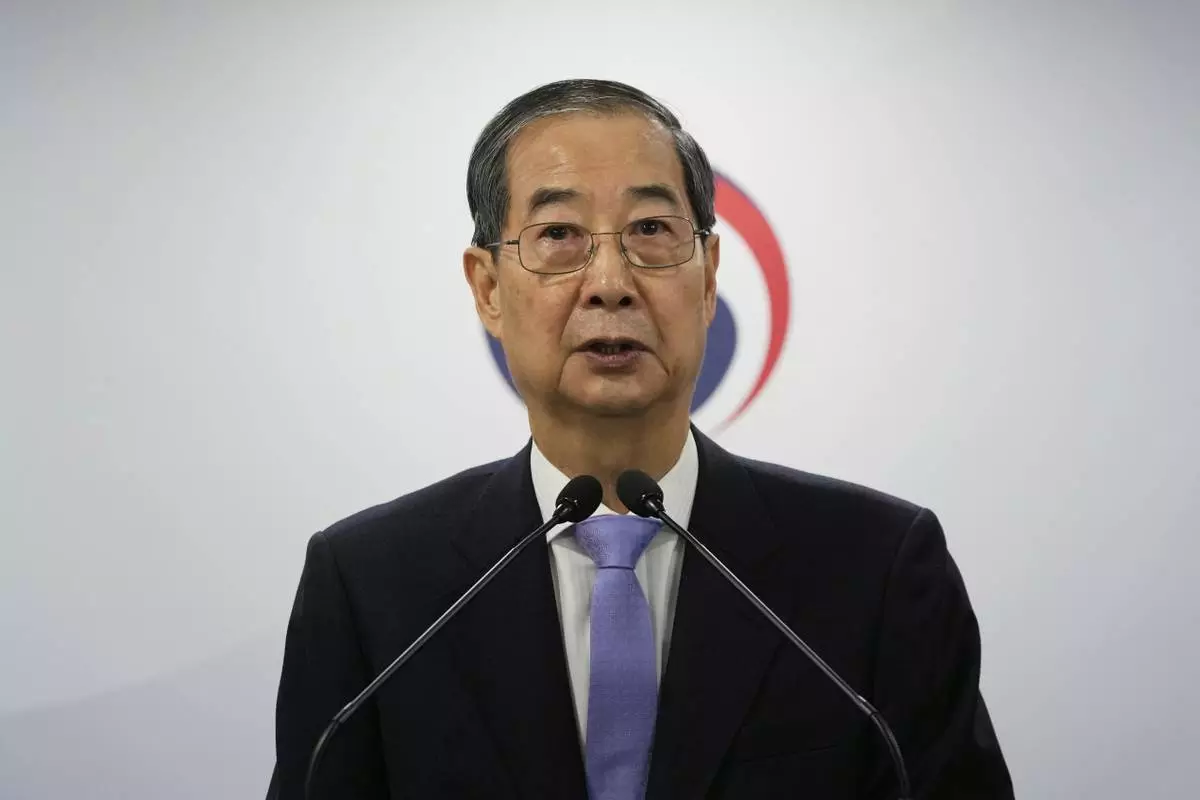
South Korean acting President Han Duck-soo speaks during a briefing at the Government Complex in Seoul, South Korea, Monday, March 24, 2025. (AP Photo/Ahn Young-joon, Pool)
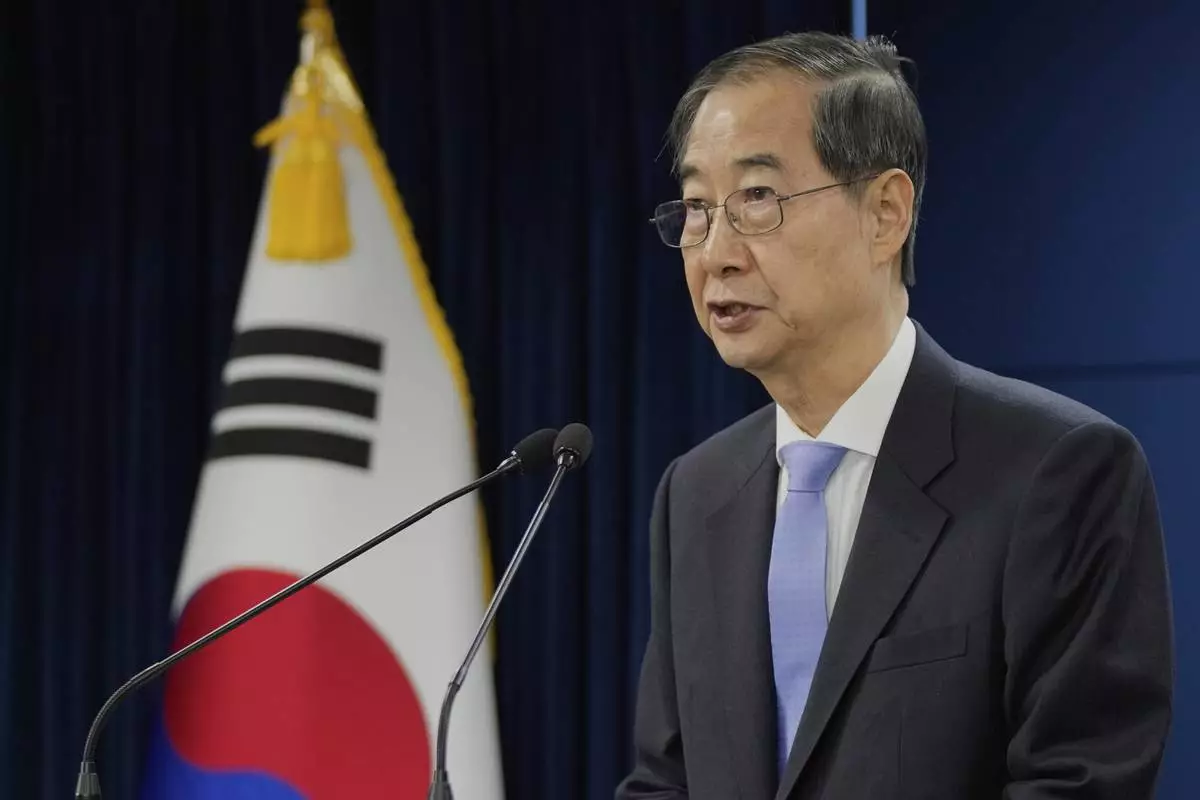
South Korean acting President Han Duck-soo speaks during a briefing at the Government Complex in Seoul, South Korea, Monday, March 24, 2025. (AP Photo/Ahn Young-joon, Pool)
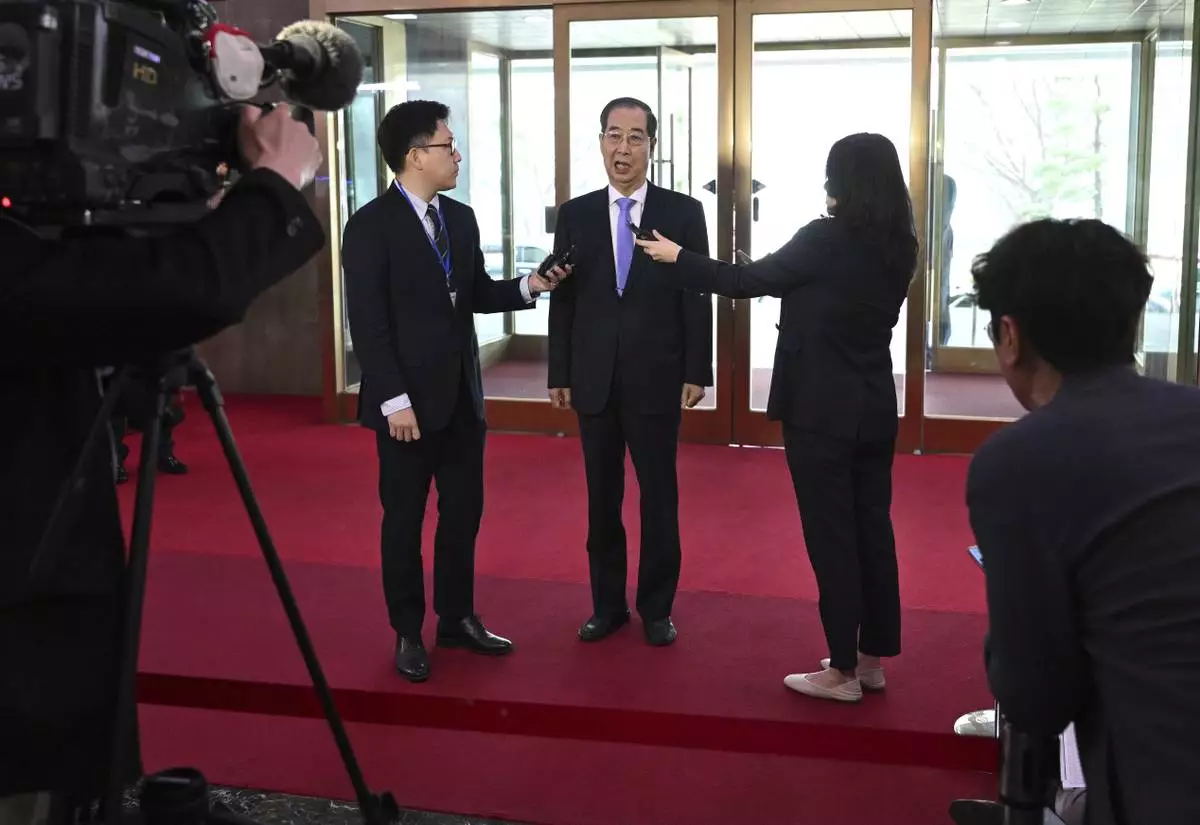
South Korean Prime Minister Han Duck-soo, center, speaks to the media as he arrives at the Government Complex in Seoul Monday, March 24, 2025, after the Constitutional Court dismissed the impeachment of the prime minister. (Jung Yeon-je/Pool Photo via AP)
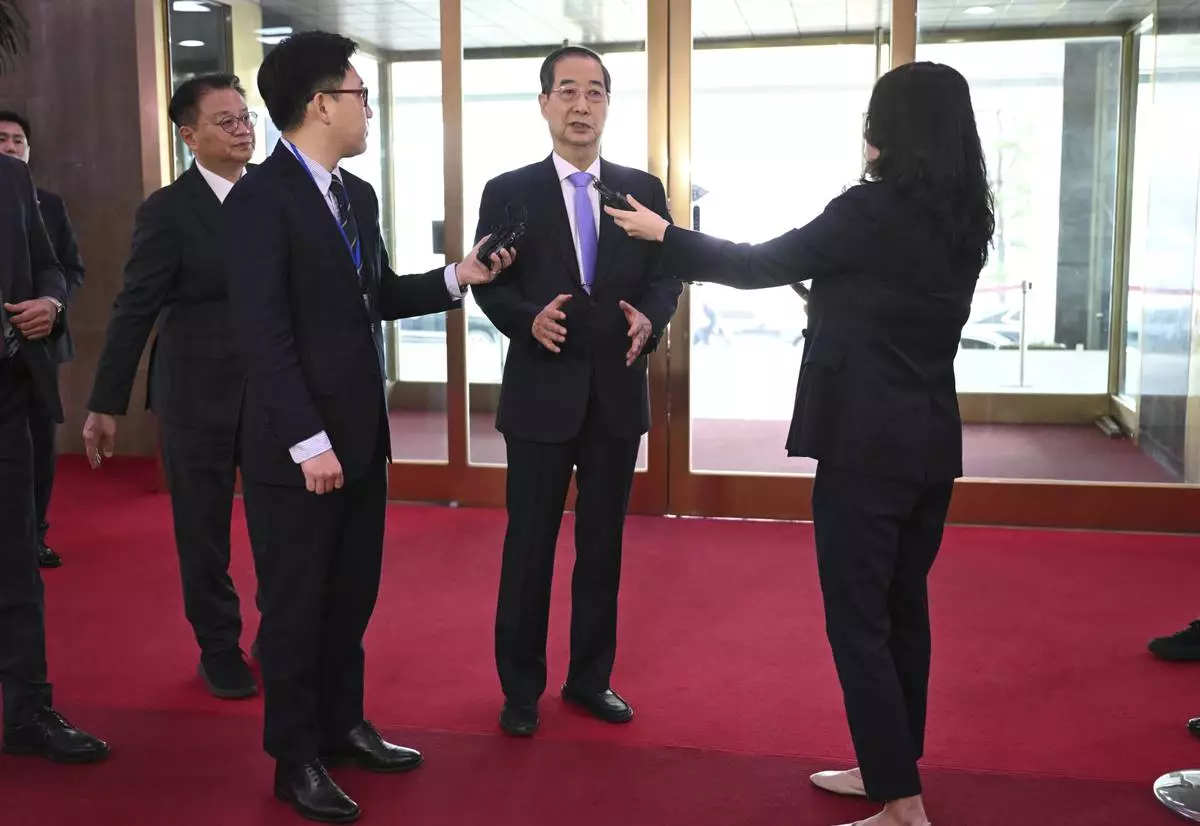
South Korean Prime Minister Han Duck-soo, center, speaks to the media as he arrives at the Government Complex in Seoul Monday, March 24, 2025, after the Constitutional Court dismissed the impeachment of the prime minister. (Jung Yeon-je/Pool Photo via AP)
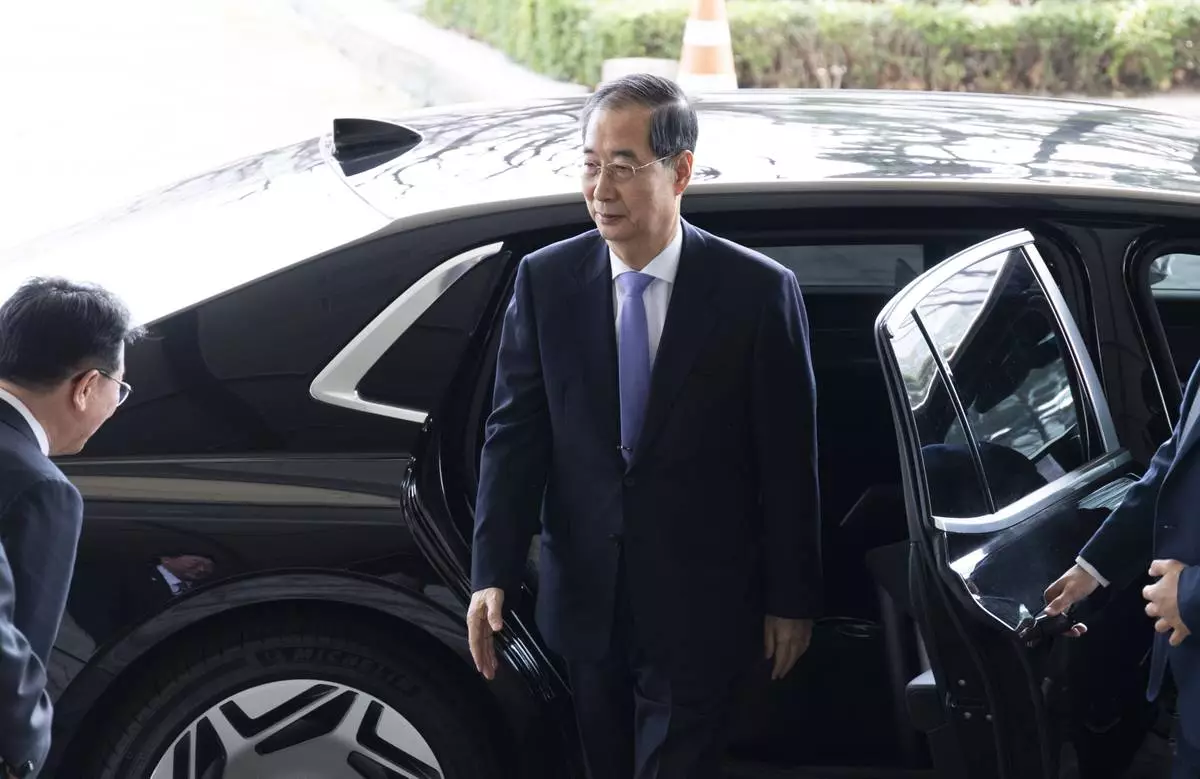
South Korean Prime Minister Han Duck-soo arrives at the Government Complex in Seoul, South Korea Monday, March 24, 2025. (Heon-Kyun Jeon /Pool Photo via AP)
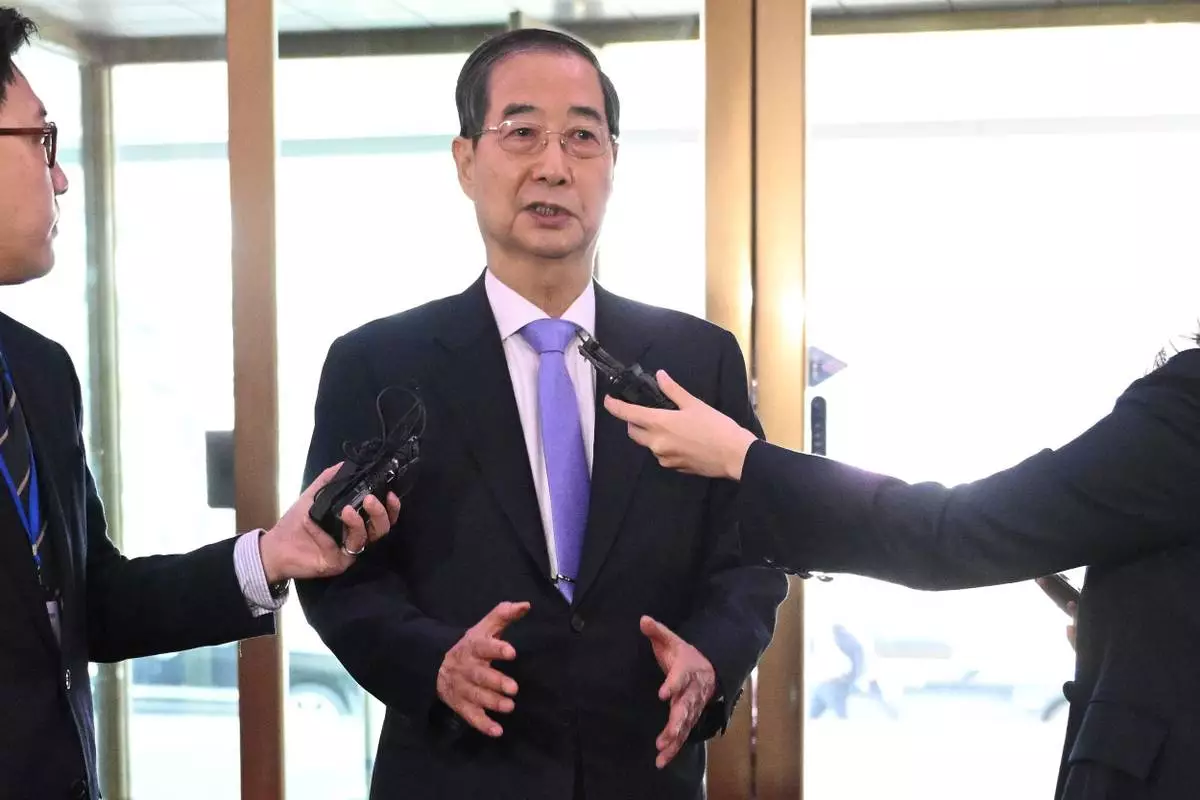
South Korean Prime Minister Han Duck-soo speaks to the media as he arrives at the Government Complex in Seoul Monday, March 24, 2025, after the Constitutional Court dismissed the impeachment of the prime minister. (Jung Yeon-je/Pool Photo via AP)
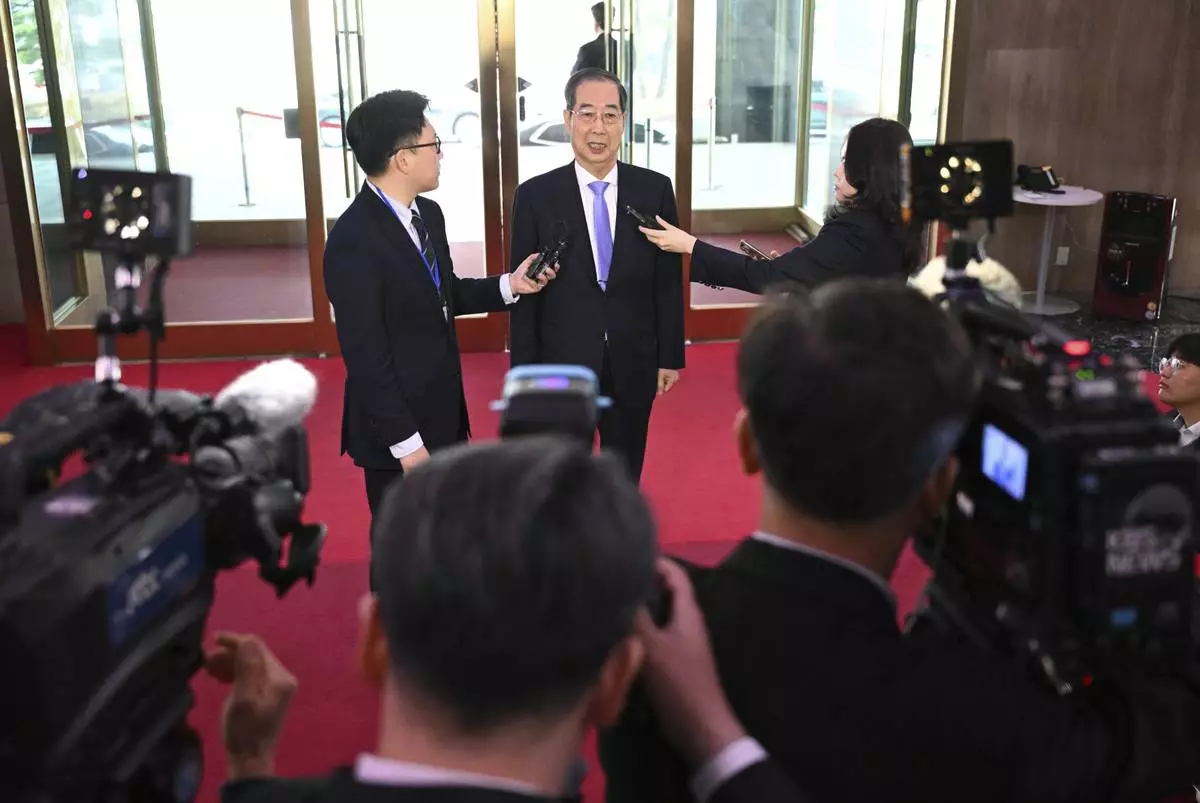
South Korean Prime Minister Han Duck-soo, center, speaks to the media as he arrives at the Government Complex in Seoul Monday, March 24, 2025, after the Constitutional Court dismissed the impeachment of the prime minister. (Jung Yeon-je/Pool Photo via AP)
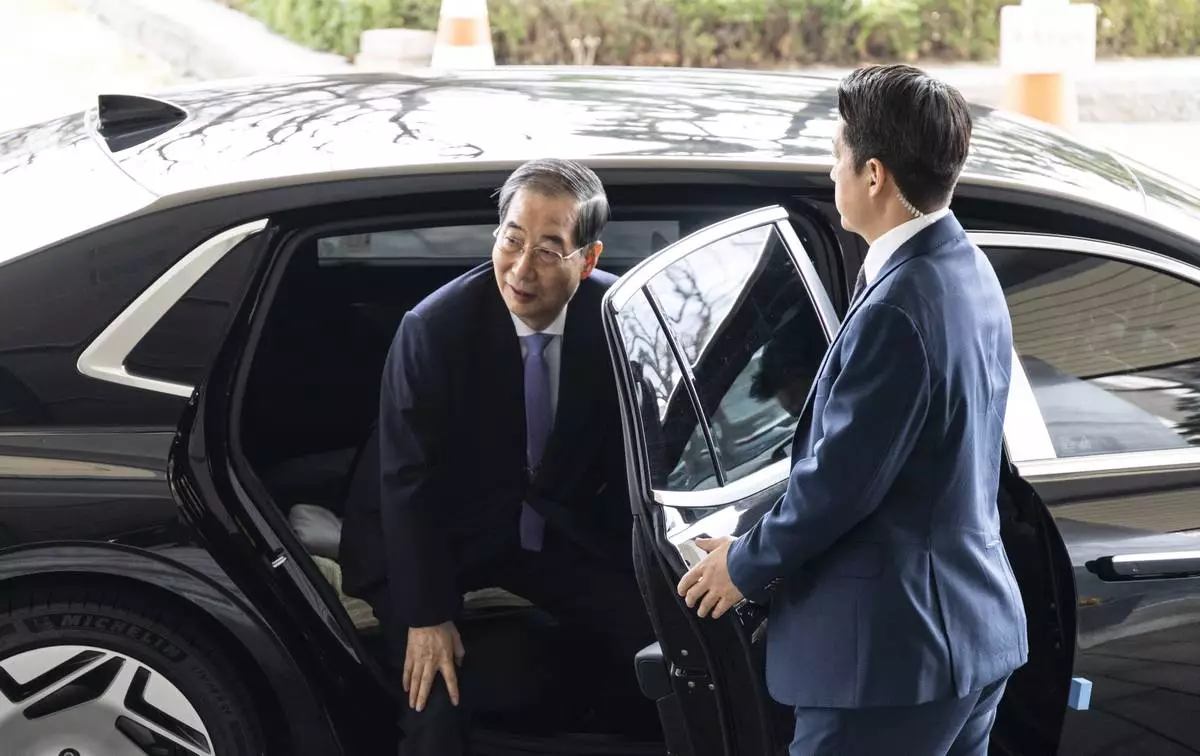
South Korean Prime Minister Han Duck-soo, left, arrives at the Government Complex in Seoul, South Korea Monday, March 24, 2025. (Heon-Kyun Jeon /Pool Photo via AP)
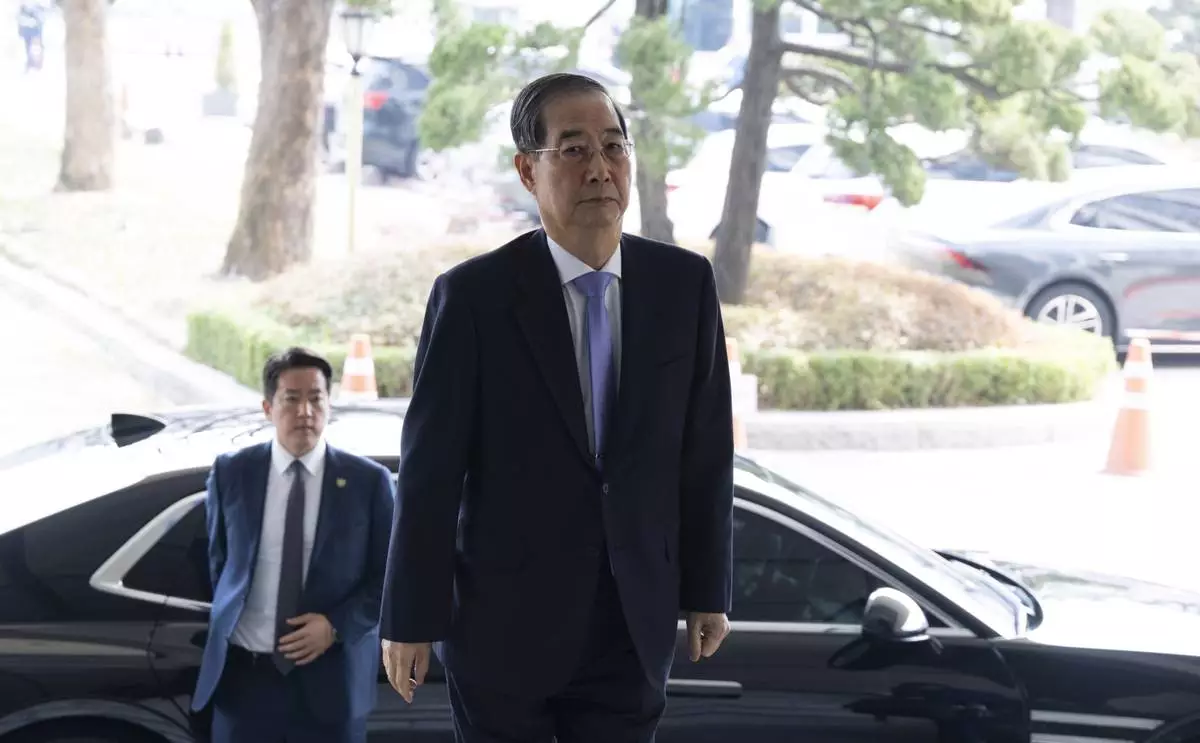
South Korean Prime Minister Han Duck-soo arrives at the Government Complex in Seoul, South Korea Monday, March 24, 2025. (Heon-Kyun Jeon /Pool Photo via AP)
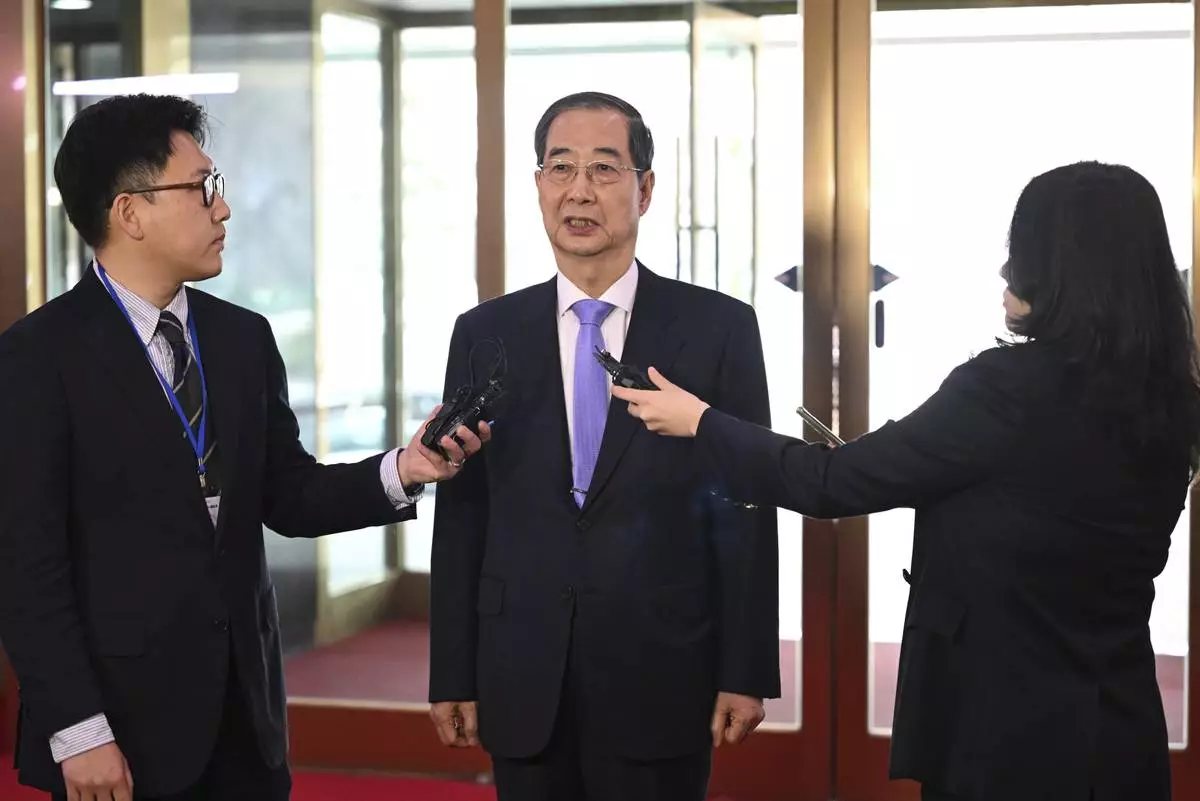
South Korean Prime Minister Han Duck-soo, center, speaks to the media as he arrives at the Government Complex in Seoul Monday, March 24, 2025, after the Constitutional Court dismissed the impeachment of the prime minister. (Jung Yeon-je/Pool Photo via AP)
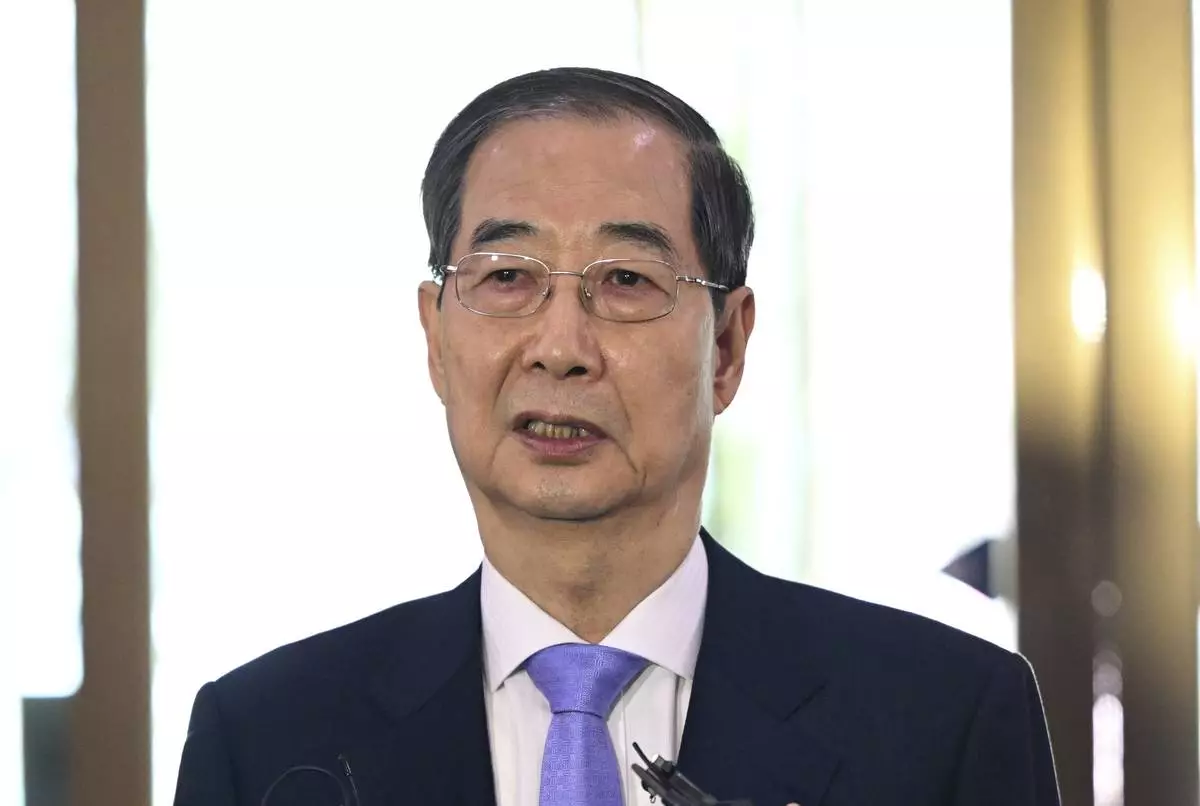
South Korean Prime Minister Han Duck-soo speaks to the media as he arrives at the Government Complex in Seoul Monday, March 24, 2025, after the Constitutional Court dismissed the impeachment of the prime minister. (Jung Yeon-je/Pool Photo via AP)
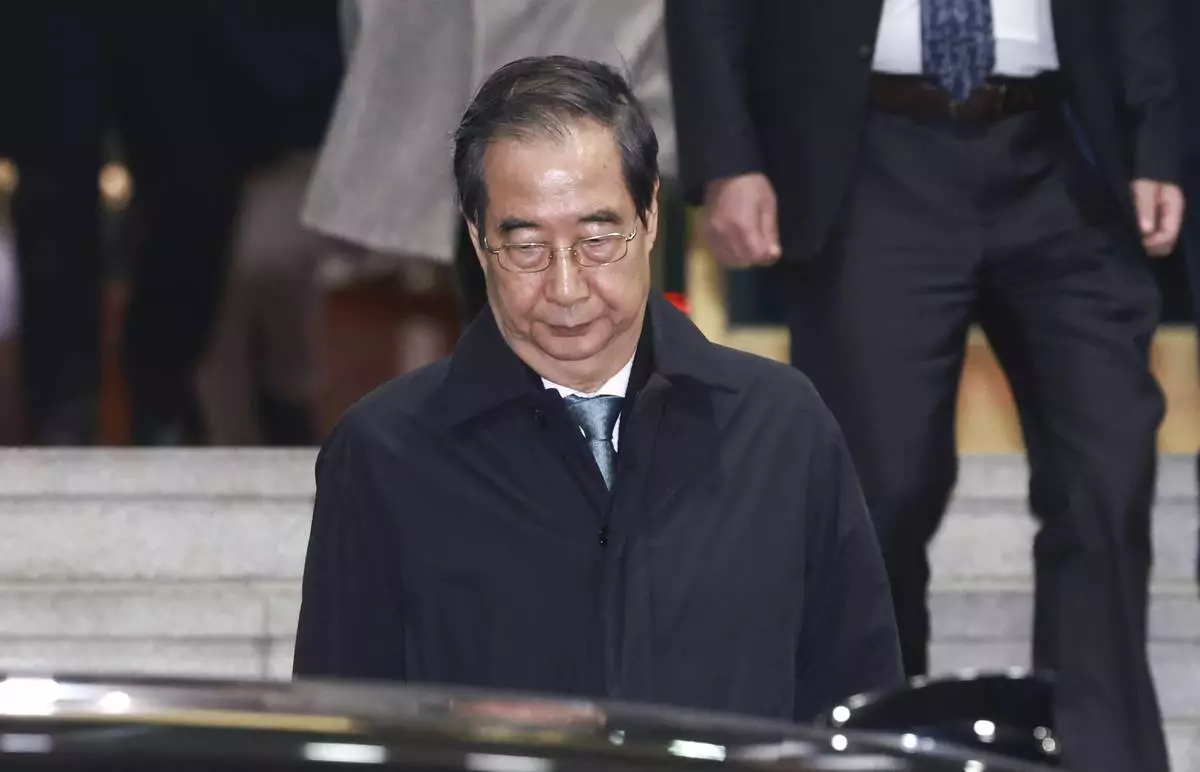
FILE - Impeached South Korean acting President Han Duck-soo leaves the government complex building in Seoul, South Korea, on Dec. 27, 2024. (Hong Hae-in/Yonhap via AP, File)
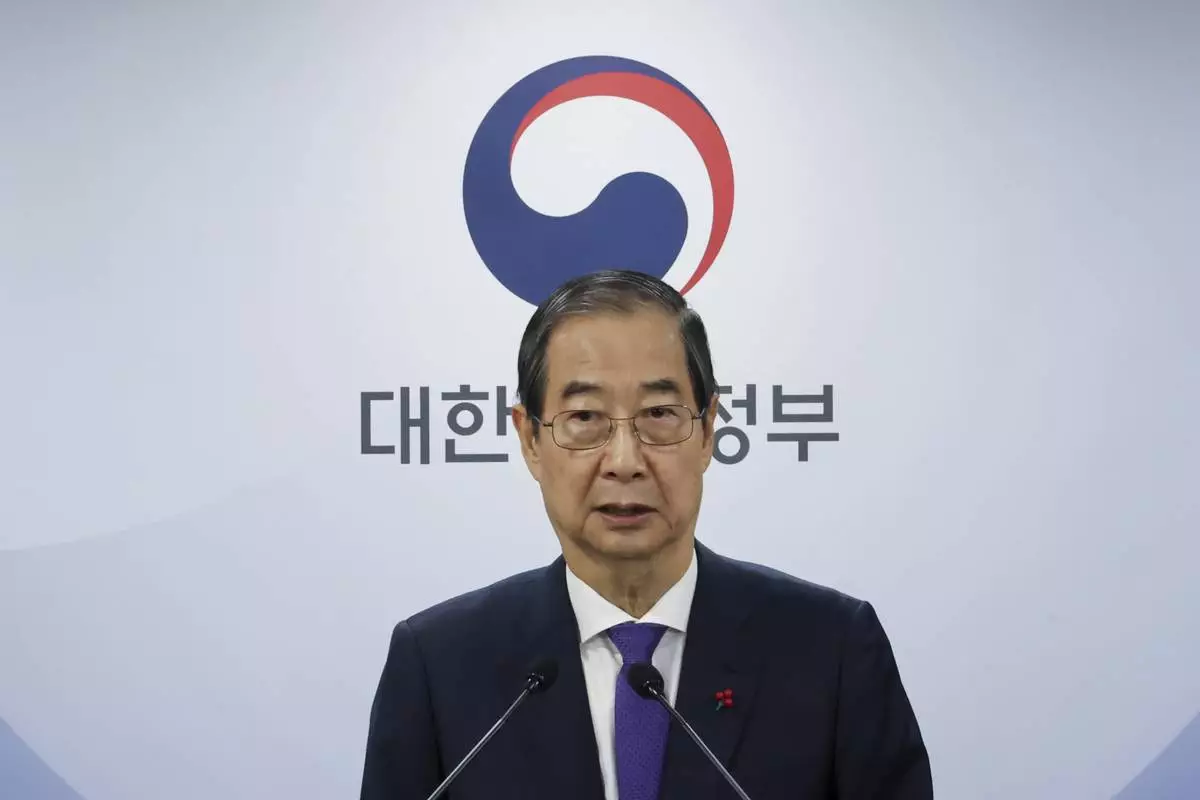
FILE - South Korea's acting President Han Duck-soo speaks at the government complex in Seoul, South Korea, on Dec. 26, 2024. (Choi Jae-koo/Yonhap via AP, File)
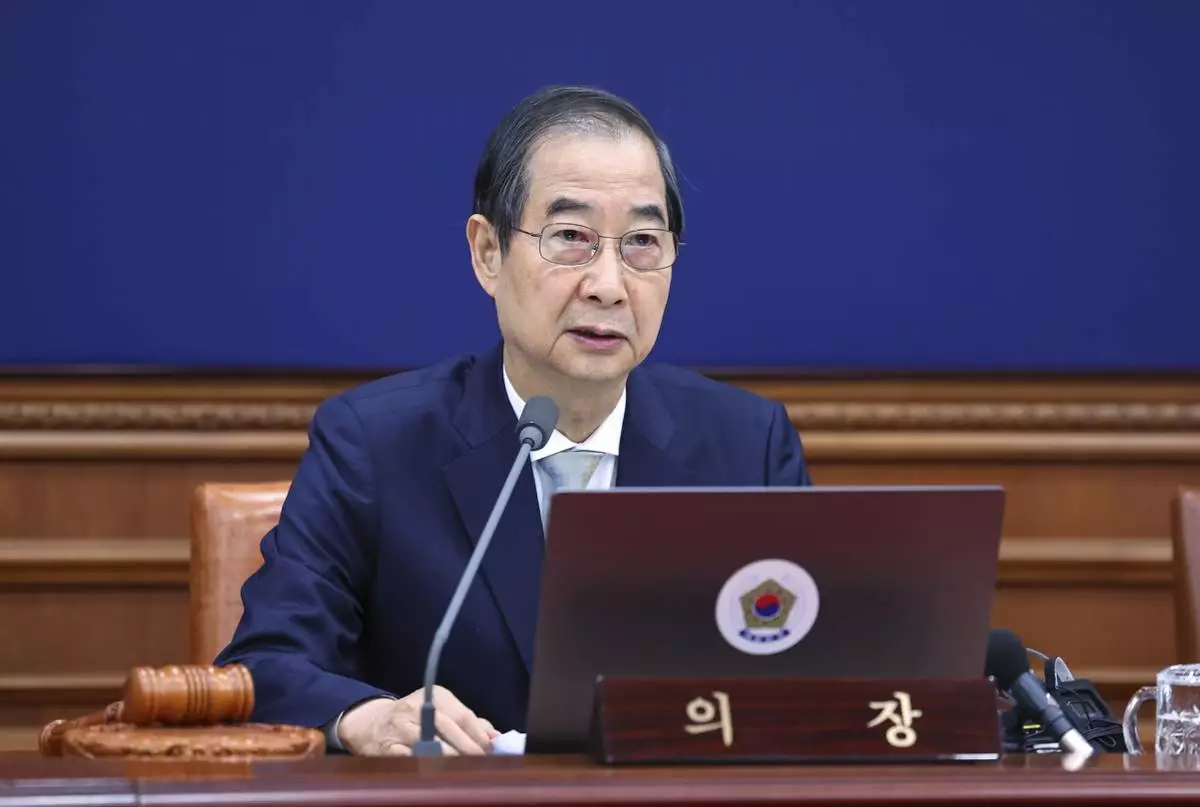
FILE - South Korea's Prime Minister Han Duck-soo, who became the country's acting leader after President Yoon Suk Yeol's impeachment, speaks during a cabinet meeting at the government complex in Seoul, South Korea, on Dec. 24, 2024. (Yonhap via AP, File)
PARIS (AP) — French President Emmanuel Macron said Wednesday that a proposed European armed force for possible deployment in Ukraine in tandem with an eventual peace deal could “respond” to a Russian attack if Moscow launched one.
Macron spoke in the evening after talks with Ukraine’s president and ahead of a summit in Paris of some 30 nations on Thursday that will discuss the proposed force for Ukraine.
“If there was again a generalized aggression against Ukrainian soil, these armies would be under attack and then it’s our usual framework of engagement,” Macron said. “Our soldiers, when they are engaged and deployed, are there to react and respond to the decisions of the commander in chief and, if they are in a conflict situation, to respond to it.”
THIS IS A BREAKING NEWS UPDATE. AP’s earlier story follows below.
PARIS (AP) — Their collective name, “coalition of the willing,” suggests that the loose grouping of Ukraine's allies certainly wants to help. But as the nearly three dozen nations gather again for more talks in Paris, it is still far from clear exactly what kind of aid they are preparing that could contribute toward their goal of making any ceasefire with Russia lasting.
French President Emmanuel Macron, who has been driving the coalition-building effort with U.K. Prime Minister Keir Starmer, is expecting 31 delegations around the table Thursday morning at the presidential Elysee Palace. That's more than Macron gathered for a first meeting in Paris in February — evidence that the coalition to help Ukraine, possibly with boots on the ground, is gathering steam, according to the presidential office.
The big elephant in the room will be the country that's missing: the United States.
U.S. President Donald Trump's administration has shown no public enthusiasm for the coalition's discussions about potentially sending troops into Ukraine after an eventual ceasefire to help make peace stick. Trump’s special envoy, Steve Witkoff, has dismissed the idea of a European deployment or even the need for it.
“It's a combination of a posture and a pose and a combination of also being simplistic,” he said in an interview with former Fox News host Tucker Carlson.
That's not the view in Europe. The shared premise upon which the coalition is being built is that Russian President Vladimir Putin's actions in Ukraine — starting with the illegal seizure of the Crimean Peninsula in 2014 and culminating in the 2022 full-scale invasion that unleashed all-out war — shows that he cannot be trusted. They believe that any peace deal will need to be backed up by security guarantees for Ukraine, to deter Putin from launching another attempt to seize it.
European officials say that in any peace-deal scenario, Ukraine's first line of defense against any future Russian aggression would be Ukraine's own army. Options for the coalition of allies could include providing more military training to help replenish the Ukrainian army's losses, which Kyiv keeps secret but are heavy after more than three years of intense fighting.
That’s something allies already have been doing, preparing more than 75,000 Ukrainian troops for battle against Russia’s larger and expanding military.
The 27-nation European Union is also pressing ahead with a so-called steel “porcupine strategy” aimed at making Ukraine an even tougher nut for Russia to crack, by strengthening its armed forces and defense industry. Britain is also pledging continued military aid so Ukraine can keep fighting if peace talks fail or a ceasefire is broken.
The basket of possible options that military chiefs and planners have been looking at in their own meetings in Paris and in the U.K. includes an array of scenarios that they've been preparing for their government leaders to consider and, ultimately, green light.
A possible option that France has been pushing would be a deployment by coalition members of a sizable force — large enough to serve toward deterrence — in central Ukraine, somewhere along the Dnieper River, away from the frontlines, said a French official who spoke on condition of anonymity about the closed-door military planning discussions.
The official said other possible options being examined are deploying a support force even further away from the fronts, in Ukraine's far west, or in a neighboring country.
British officials have said a Europe-led force could consist of between 10,000 and 30,000 troops — which would be a considerable effort for nations that shrank their militaries after the Cold War but are now rearming.
A second French official, at the president's office, said France does not envisage a troop contingent serving in Ukraine as “combat forces” but rather as “reassurance forces. That is to say signals of our presence, of support for Ukraine in various military tasks." The official also spoke anonymously, under the French presidency’s customary practices.
The official said missions and contours of the proposed force are still a work in progress but the aim remains for France and Britain to put it together with “numerous European countries.”
But some countries are more comfortable with a potential deployment than others — not least because one of the big unknowns is whether U.S. military forces and intelligence agencies would get Trump's green light to offer back-office support for any European force in Ukraine.
Russia is bristling at the prospect of a force involving NATO-nation troops and demanding that military and intelligence aid for Ukraine cease.
The war has turned the leaders of France and Ukraine into close partners. Macron and President Volodymyr Zelenskyy will get the summit ball rolling by meeting first together at the Elysee on Wednesday night, to prepare the talks due to start at 10 a.m. the next morning. Macron will give a press conference after the discussions.
AP journalists Jill Lawless and Emma Burrows in London and Lorne Cook in Brussels contributed.
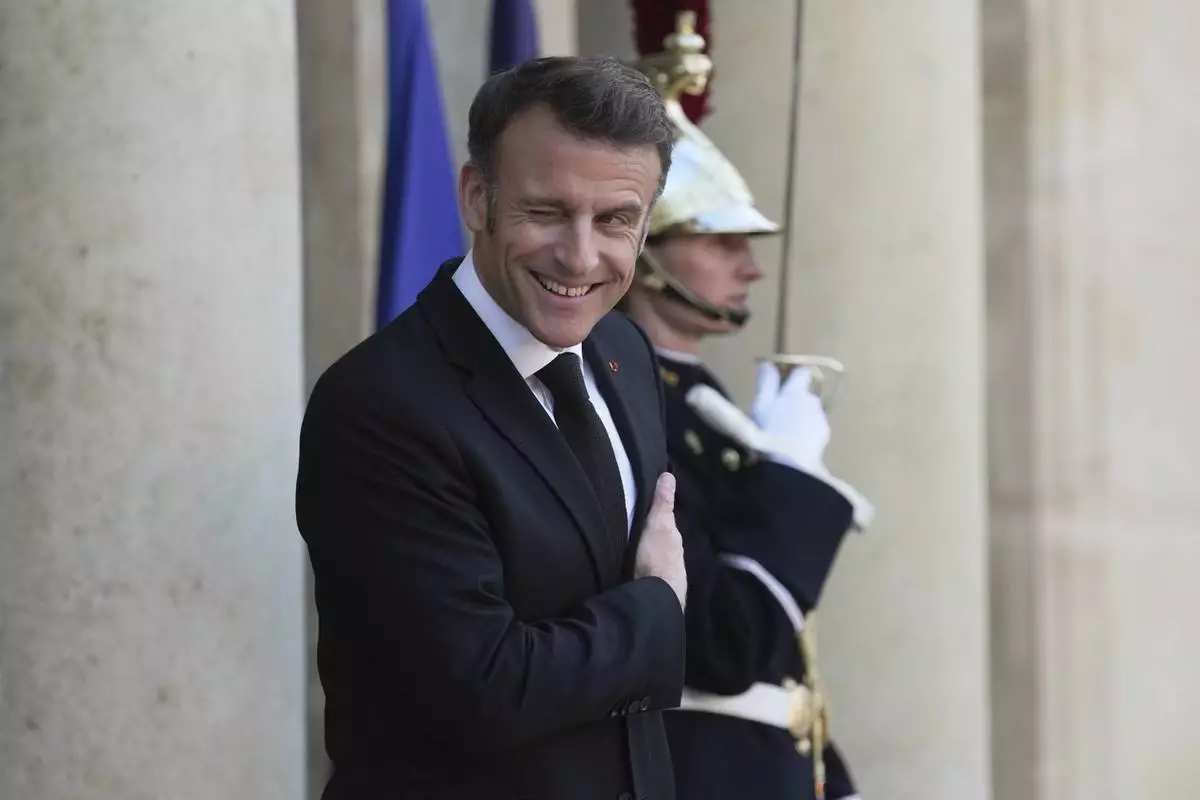
French President Emmanuel Macron waits for Ukrainian President Volodymyr Zelenskyy before their meeting to prepare Thursday's gathering of the so-called "coalition of the willing" nations that are allies of Ukraine, Wednesday, March 26, 2025 at the Elysee Palace in Paris. (AP Photo/Thibault Camus)
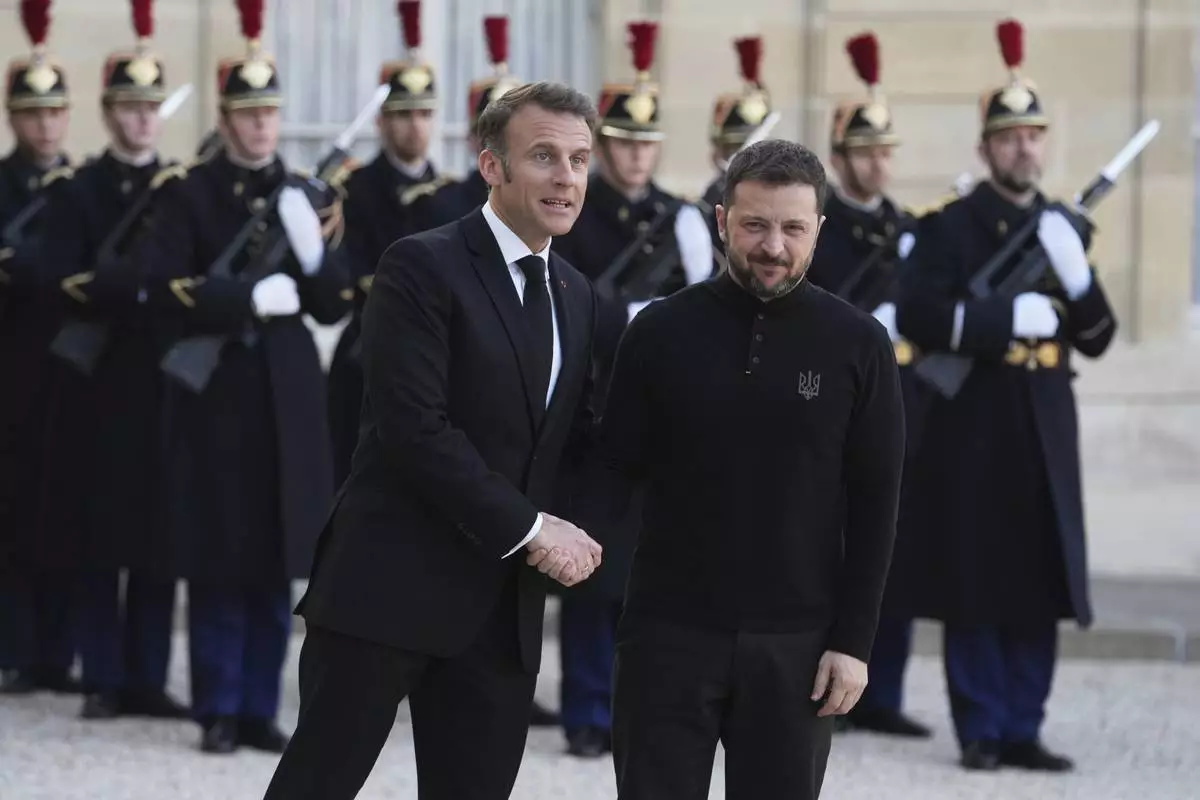
French President Emmanuel Macron, left, welcomes Ukrainian President Volodymyr Zelenskyy before their meeting to prepare Thursday's gathering of the so-called "coalition of the willing" nations that are allies of Ukraine, Wednesday, March 26, 2025 at the Elysee Palace in Paris. (AP Photo/Thibault Camus)
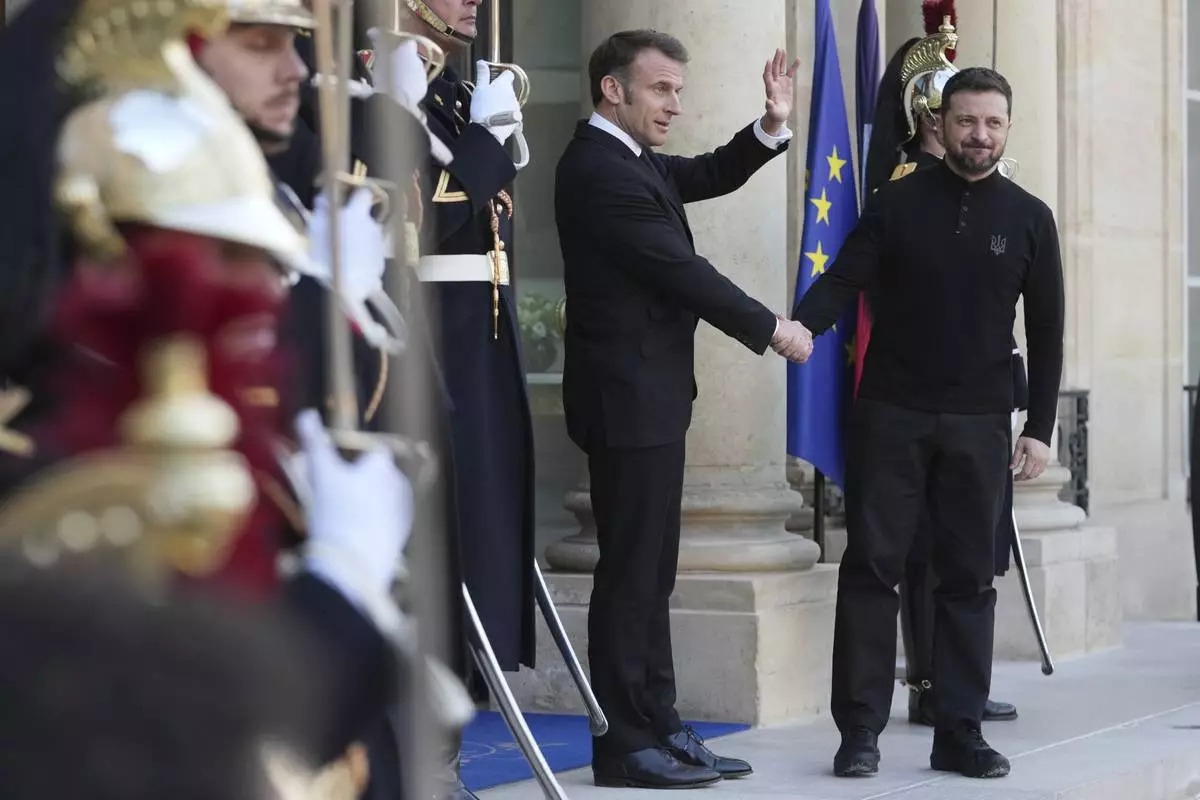
French President Emmanuel Macron, left, welcomes Ukrainian President Volodymyr Zelenskyy before their meeting to prepare Thursday's gathering of the so-called "coalition of the willing" nations that are allies of Ukraine, Wednesday, March 26, 2025 at the Elysee Palace in Paris. (AP Photo/Thibault Camus)
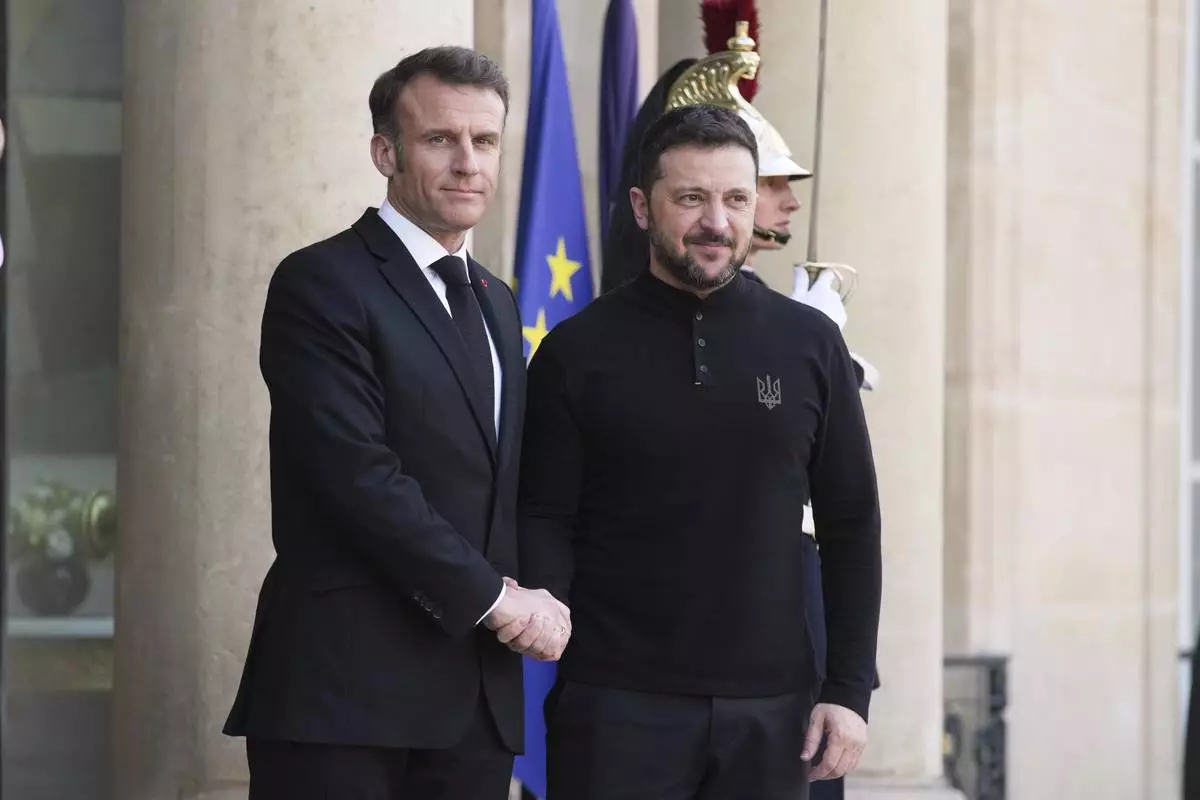
French President Emmanuel Macron, left, welcomes Ukrainian President Volodymyr Zelenskyy before their meeting to prepare Thursday's gathering of the so-called "coalition of the willing" nations that are allies of Ukraine, Wednesday, March 26, 2025 at the Elysee Palace in Paris. (AP Photo/Thibault Camus)
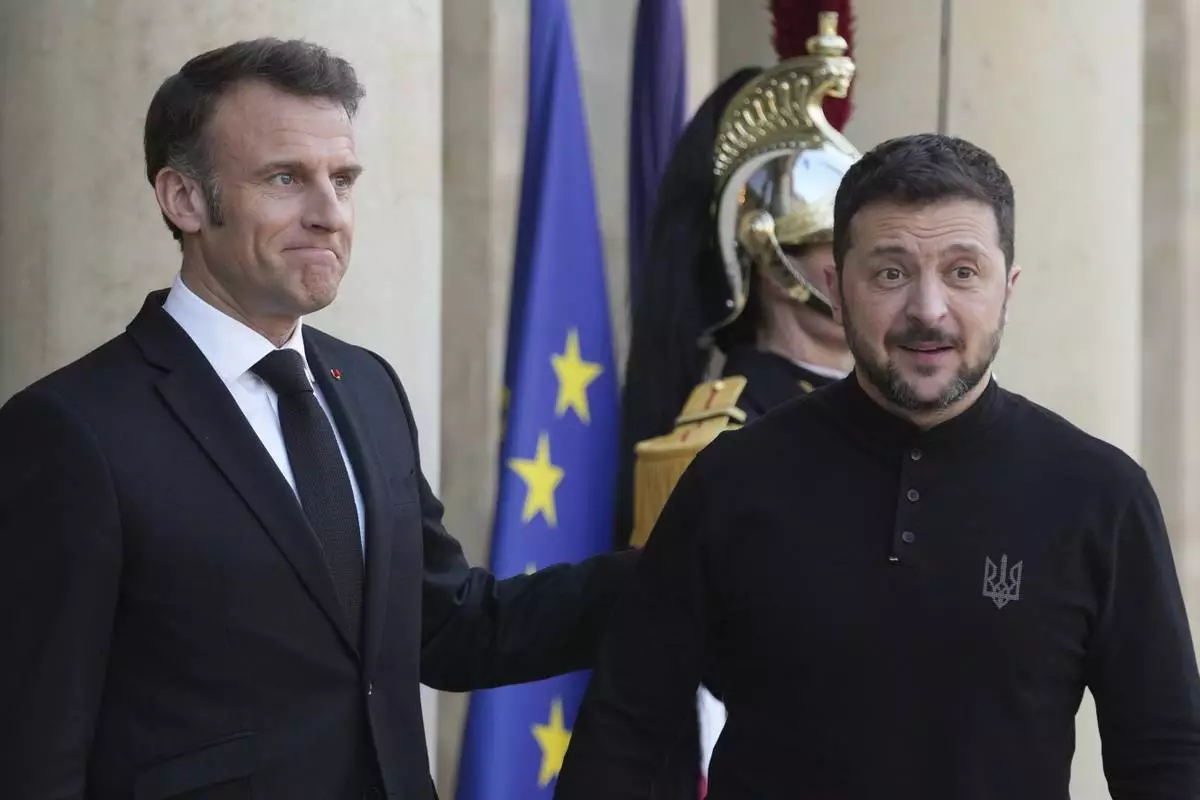
French President Emmanuel Macron, left, welcomes Ukrainian President Volodymyr Zelenskyy before their meeting to prepare Thursday's gathering of the so-called "coalition of the willing" nations that are allies of Ukraine, Wednesday, March 26, 2025 at the Elysee Palace in Paris. (AP Photo/Thibault Camus)
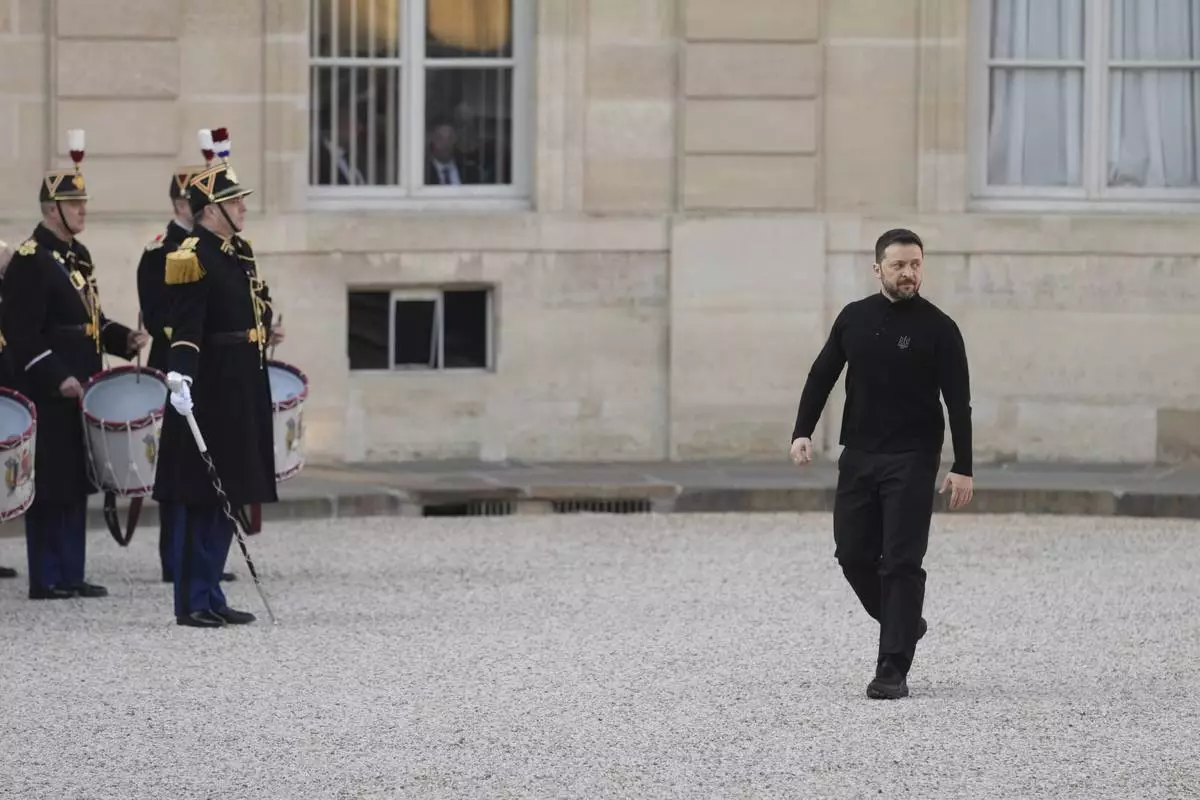
Ukrainian President Volodymyr Zelenskyy arrives before his meeting with French President Emmanuel Macron to prepare Thursday's gathering of the so-called "coalition of the willing" nations that are allies of Ukraine, Wednesday, March 26, 2025 at the Elysee Palace in Paris. (AP Photo/Thibault Camus)
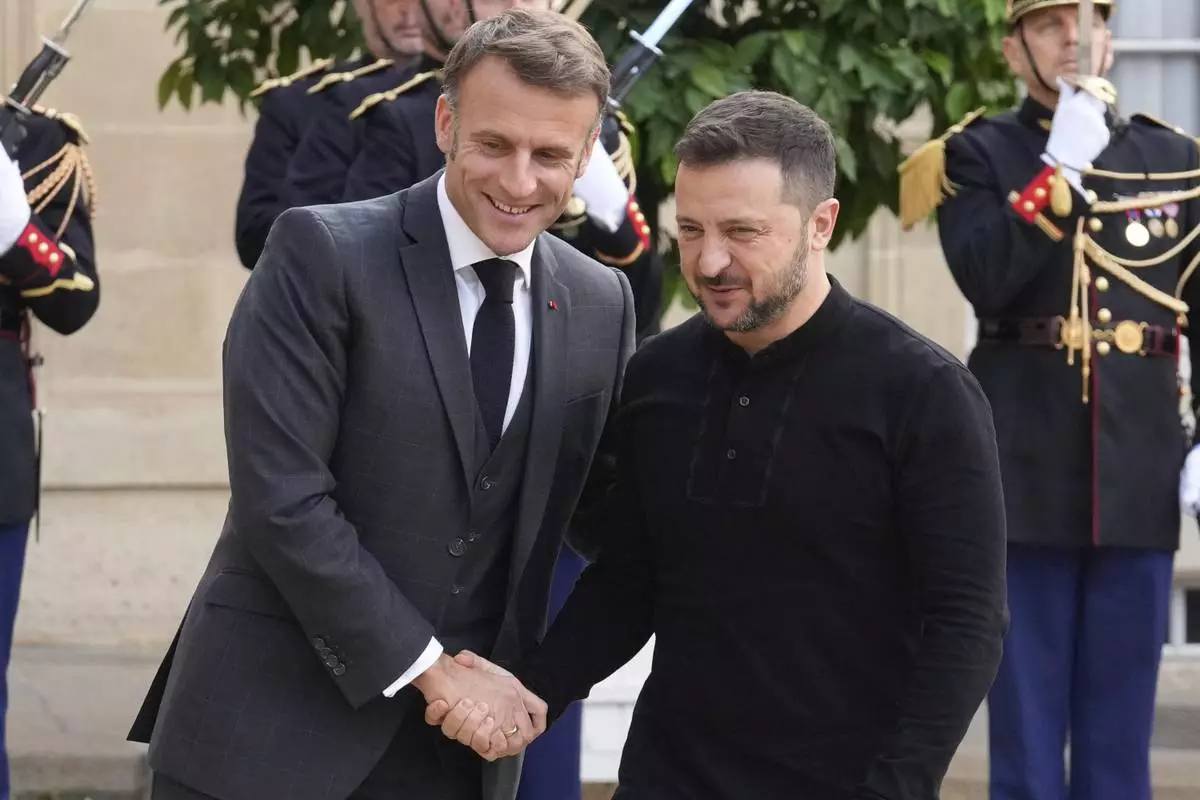
FILE - French President Emmanuel Macron, left, welcomes his Ukrainian counterpart Volodymyr Zelenskyy before a meeting at the Elysee Palace, in Paris, Thursday, Oct. 10, 2024. (AP Photo/Michel Euler, File)






















